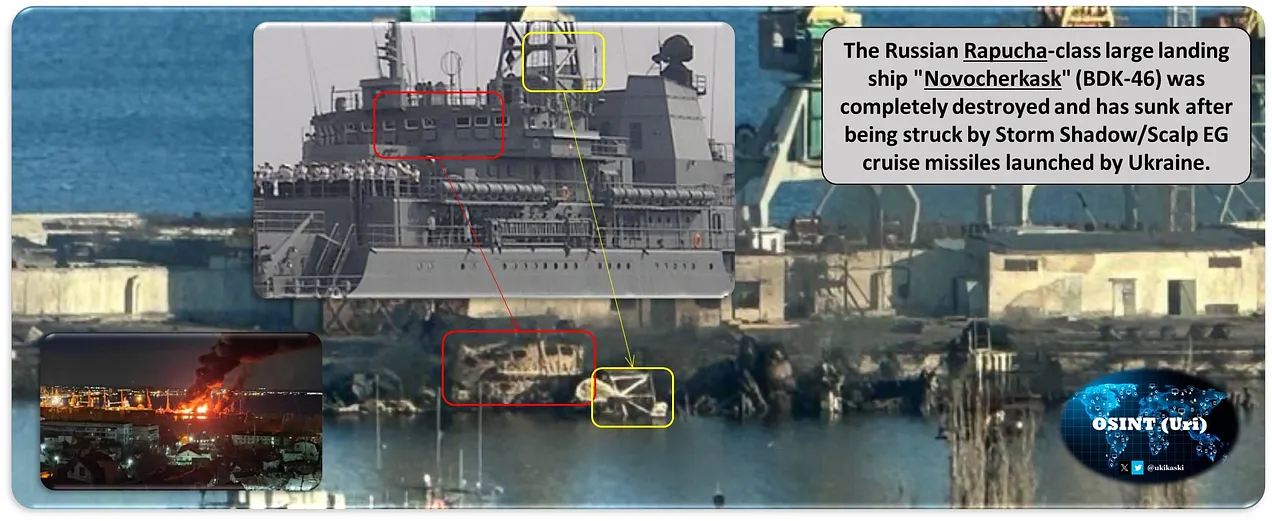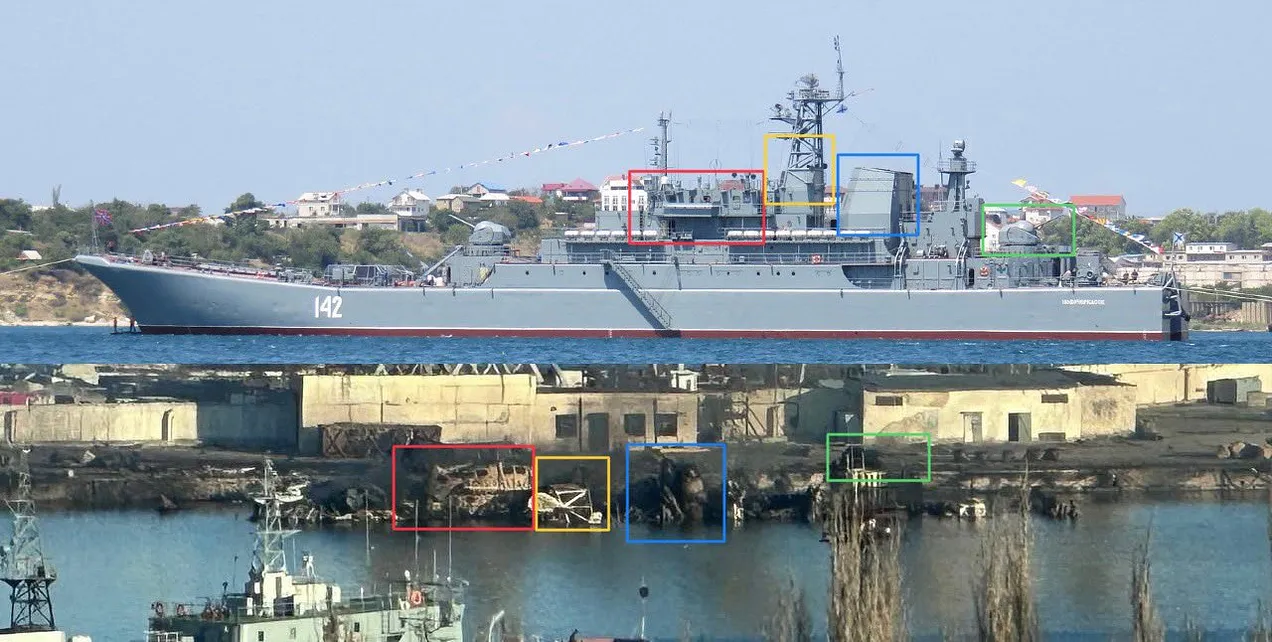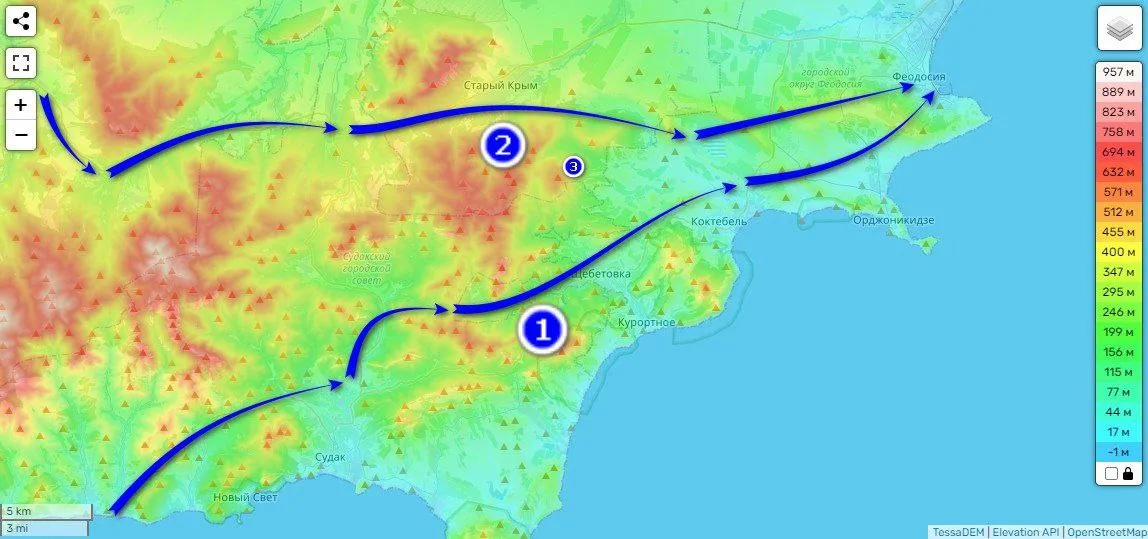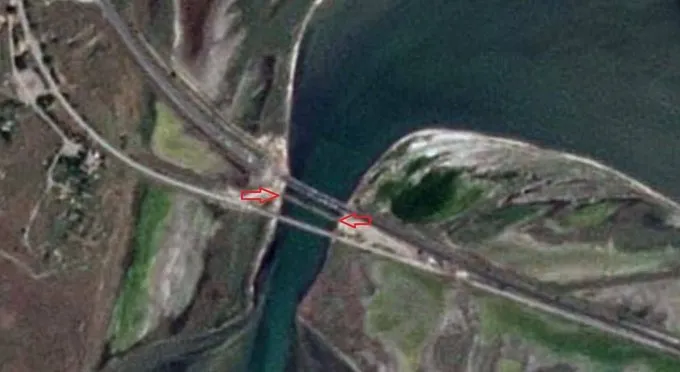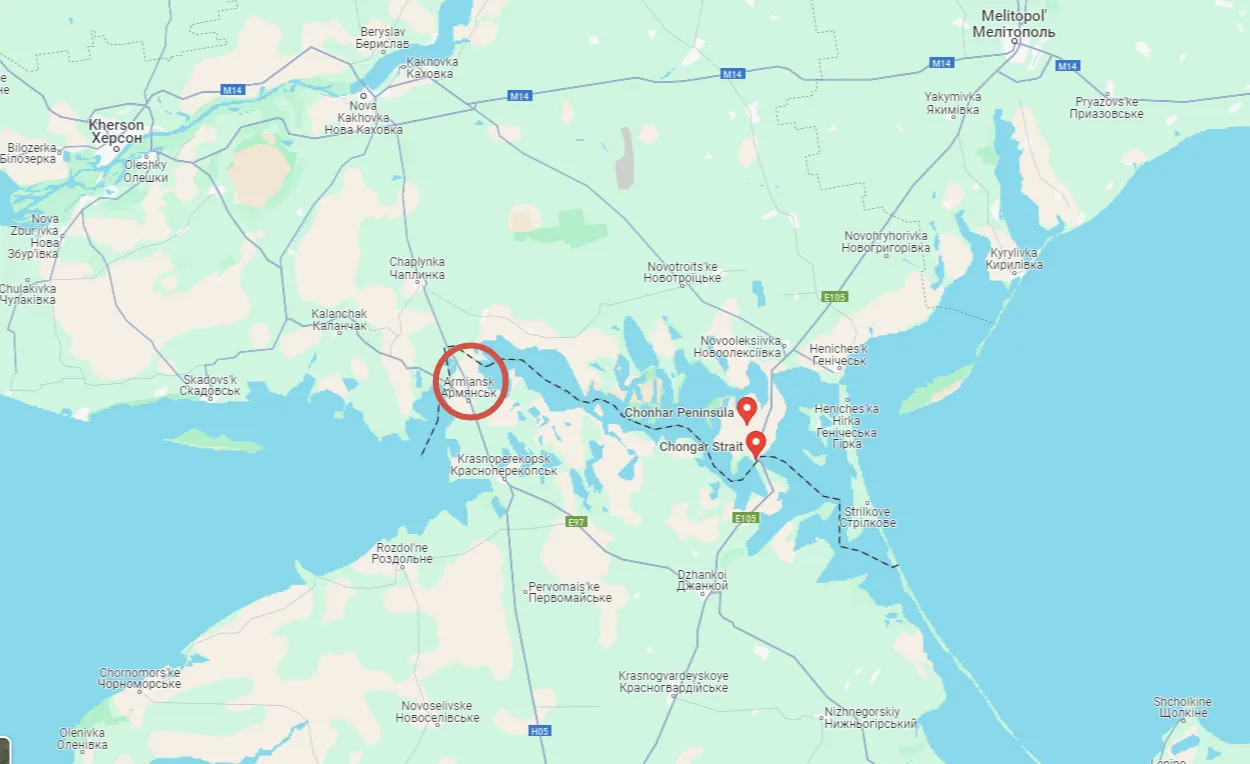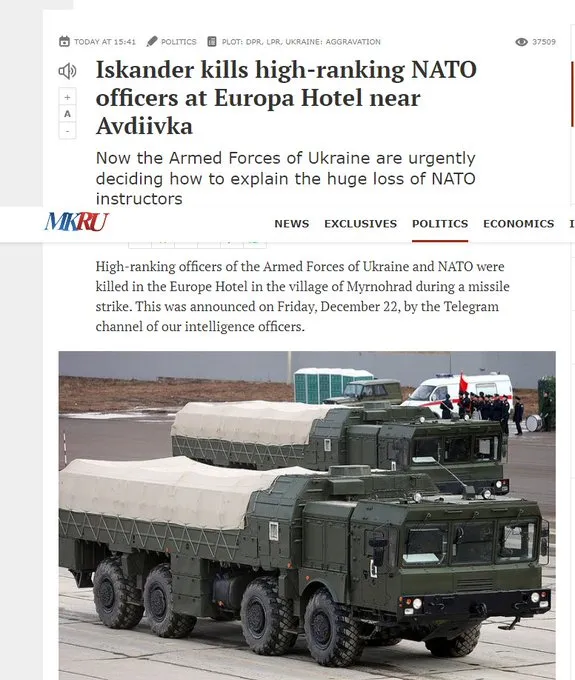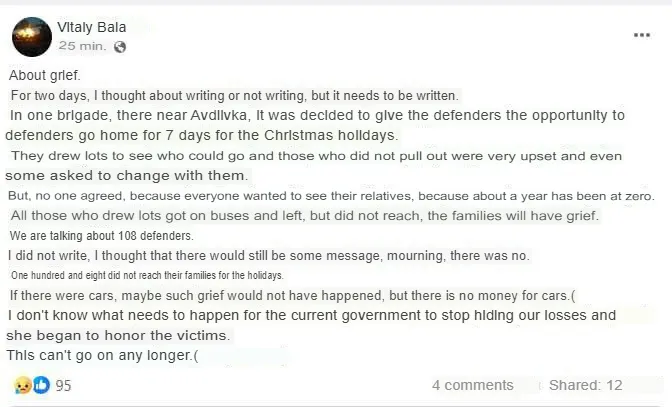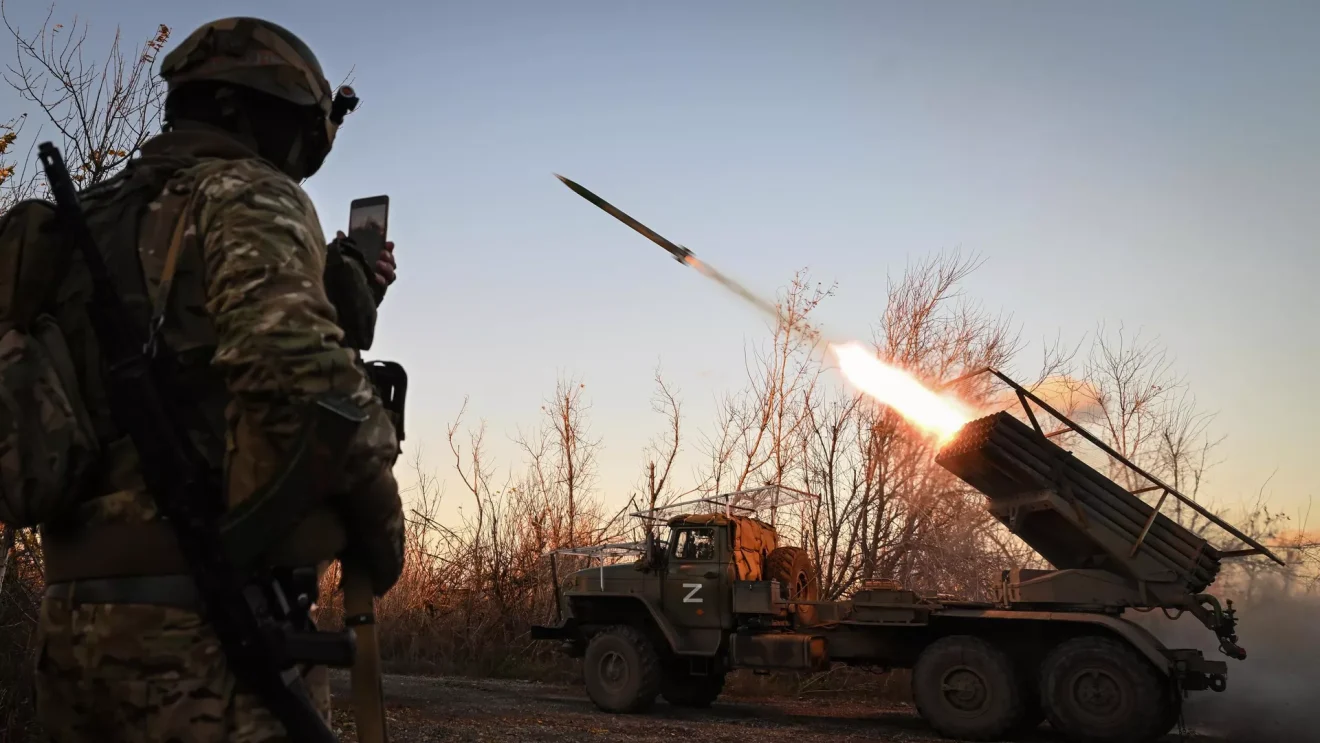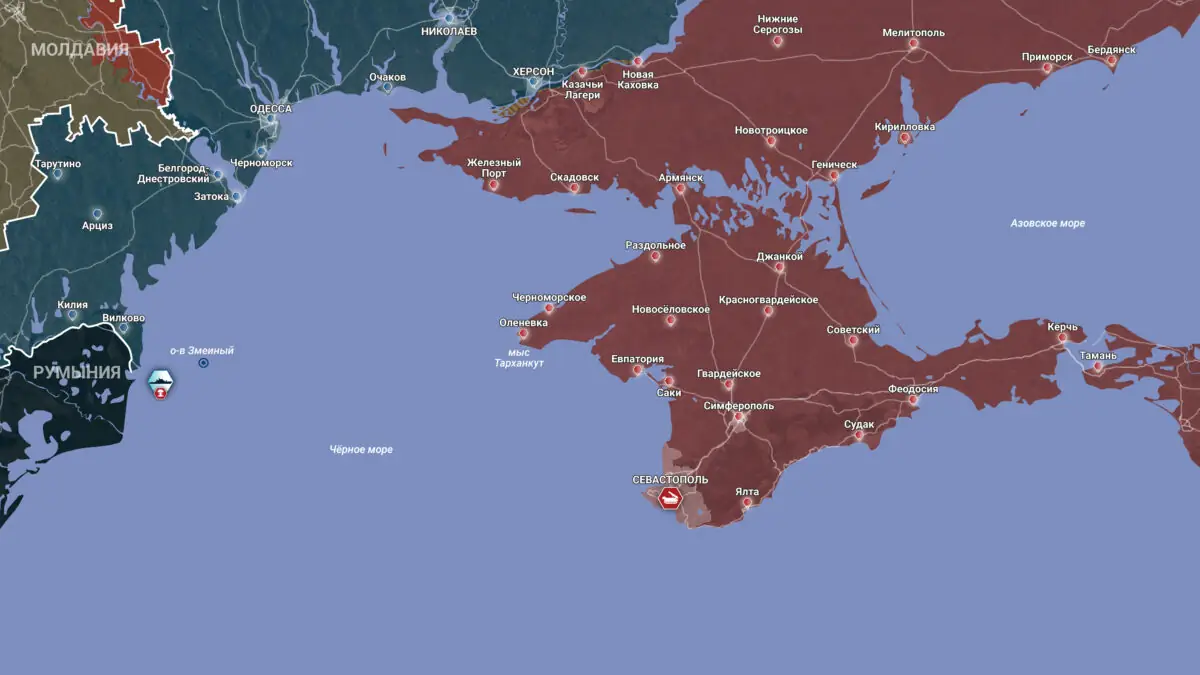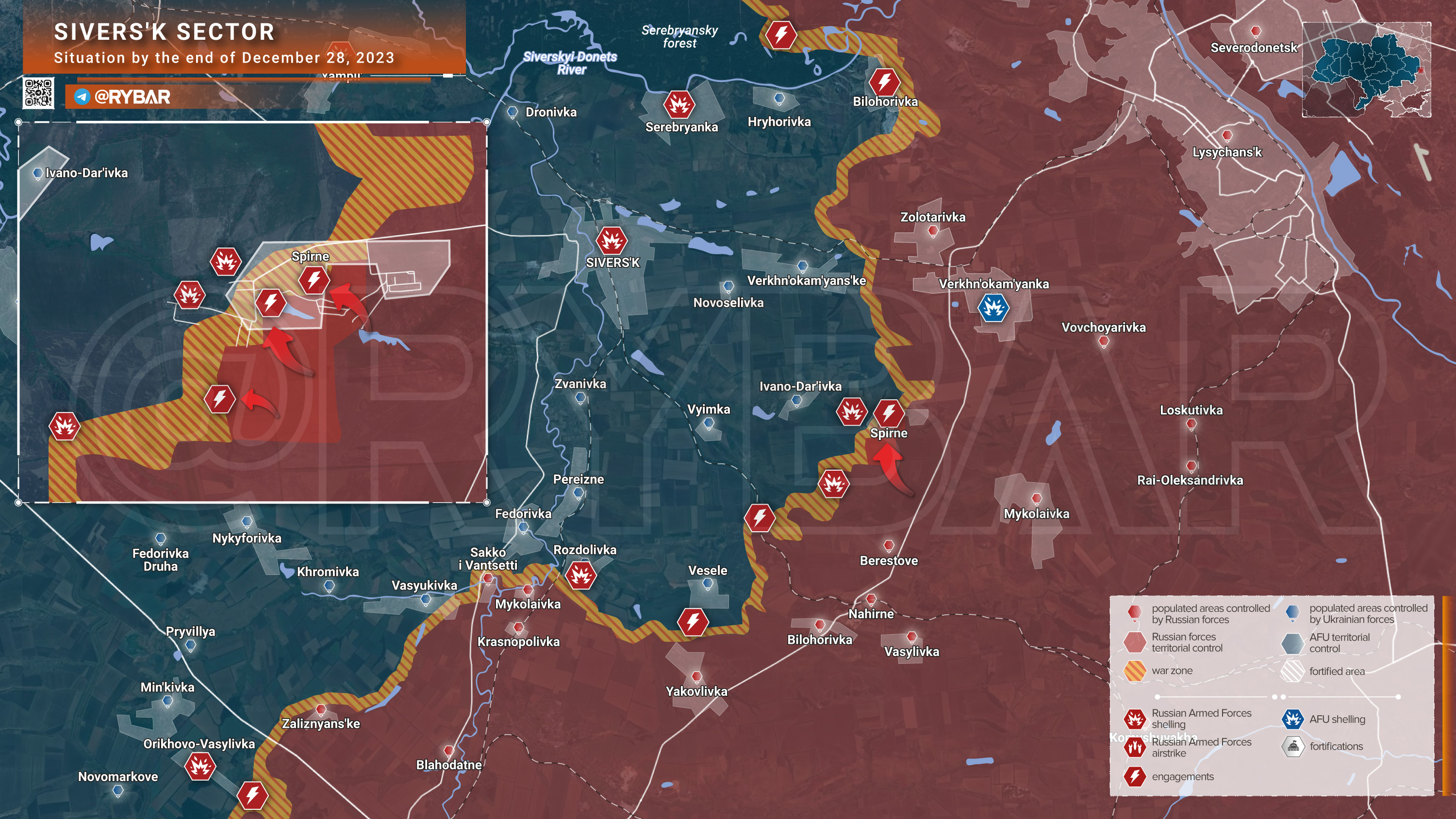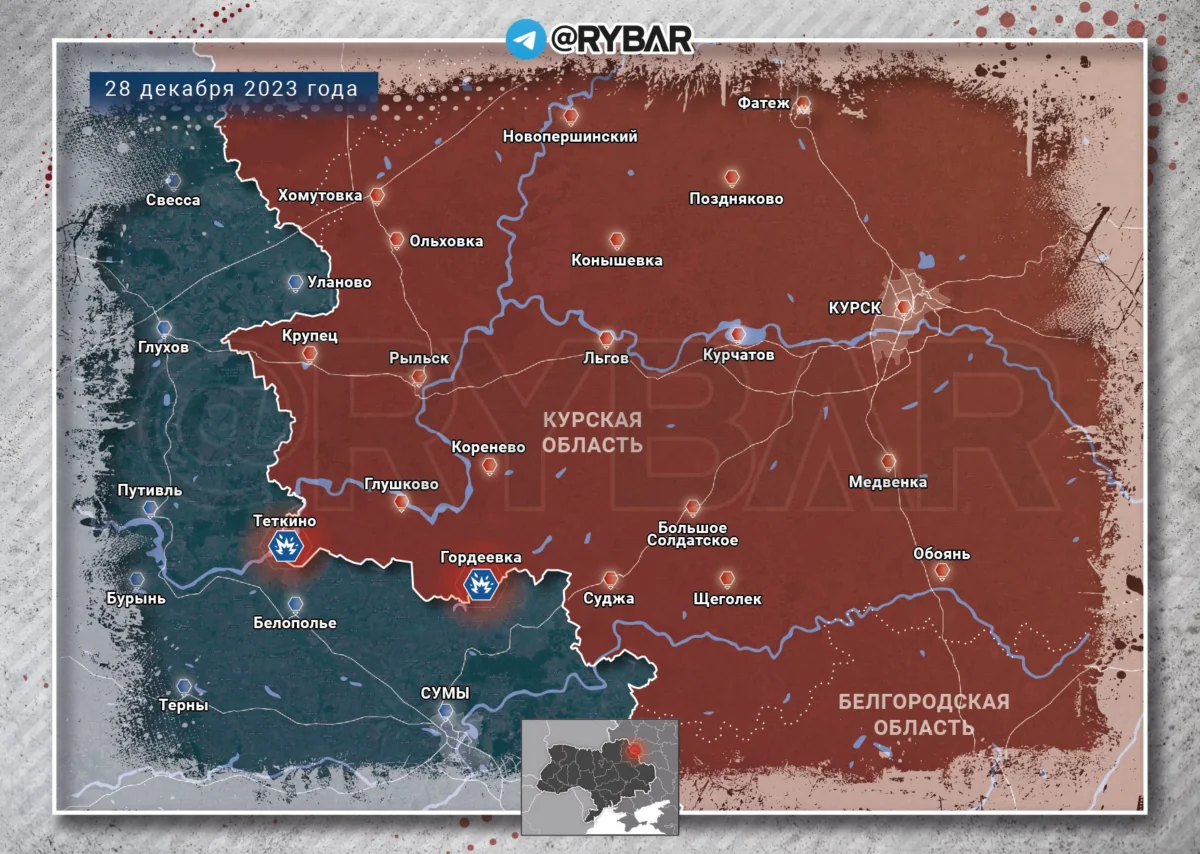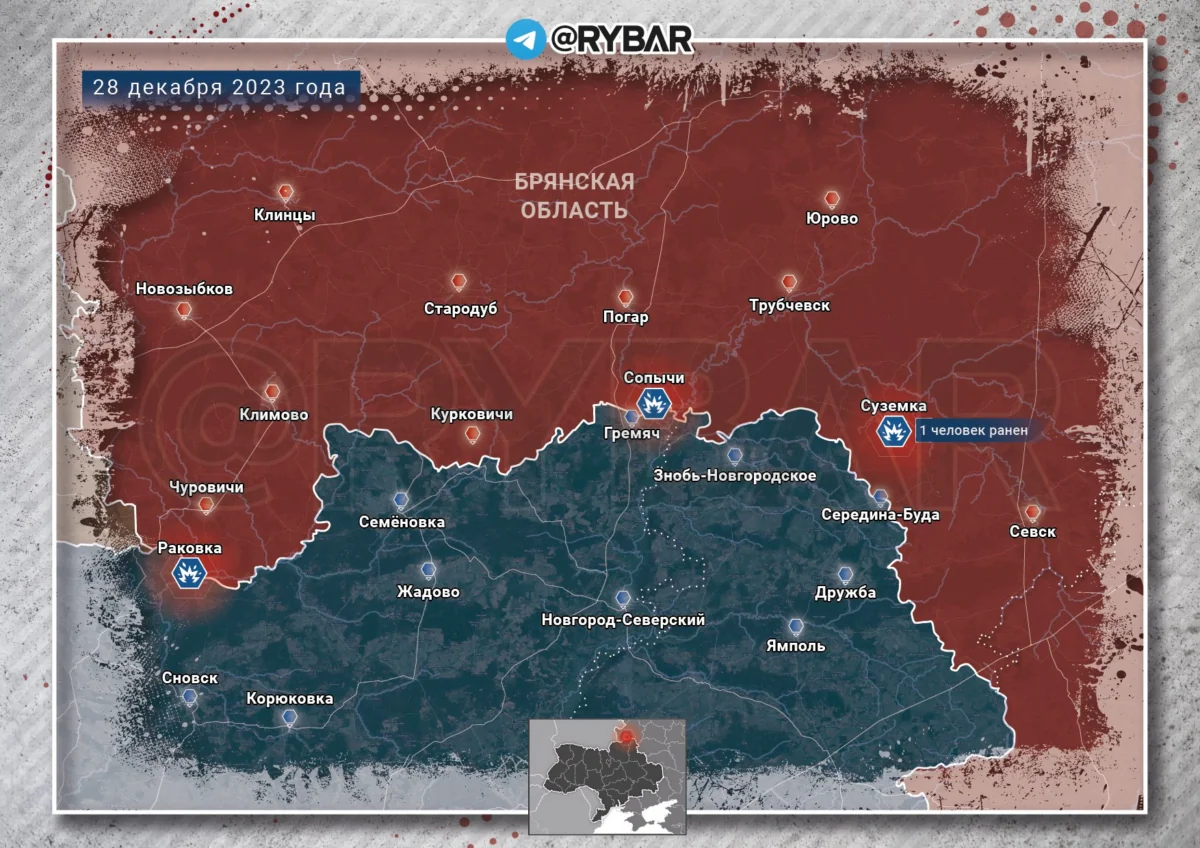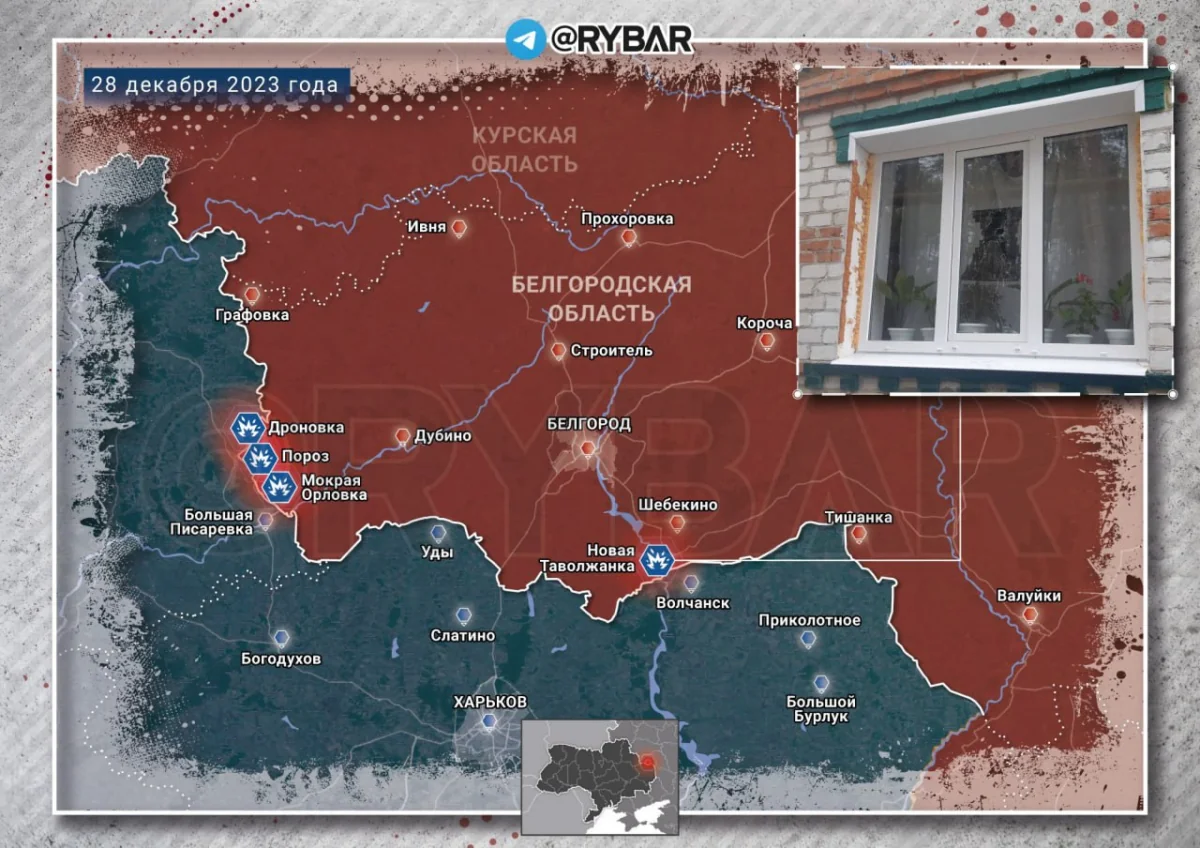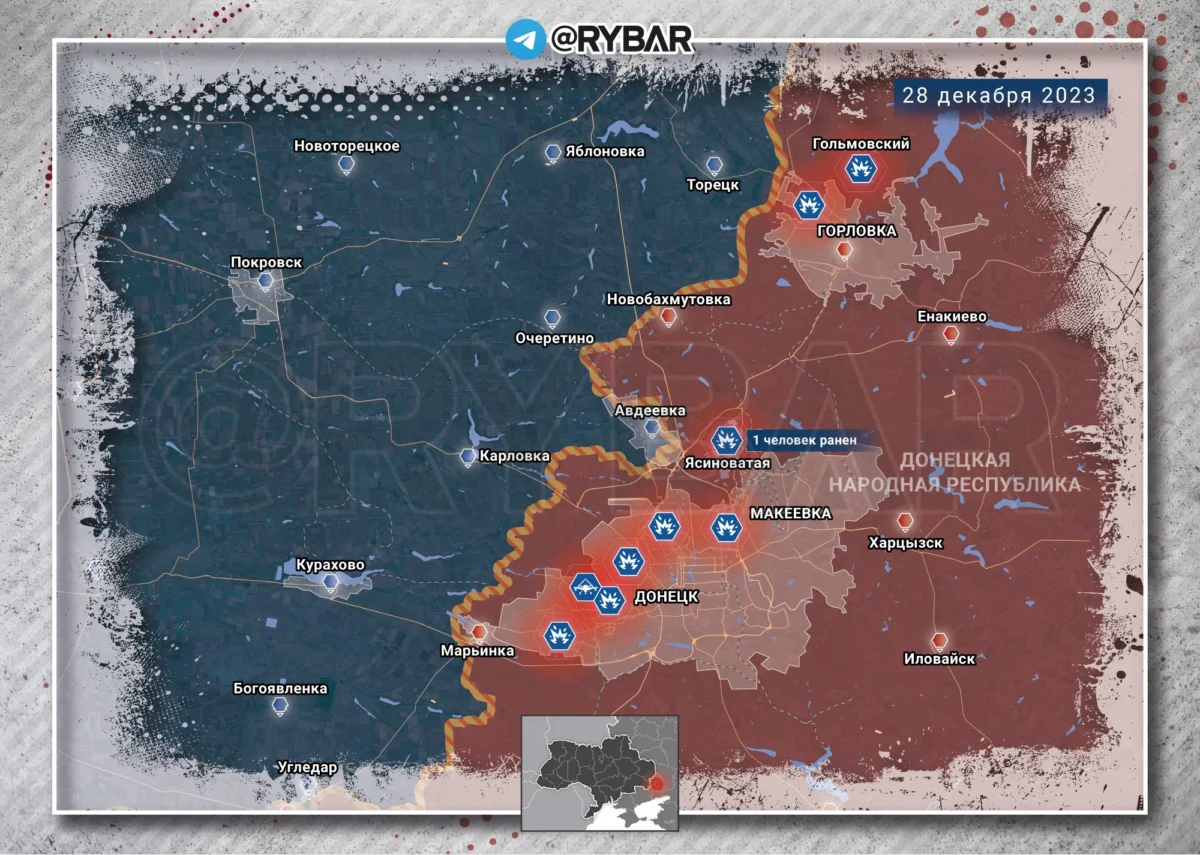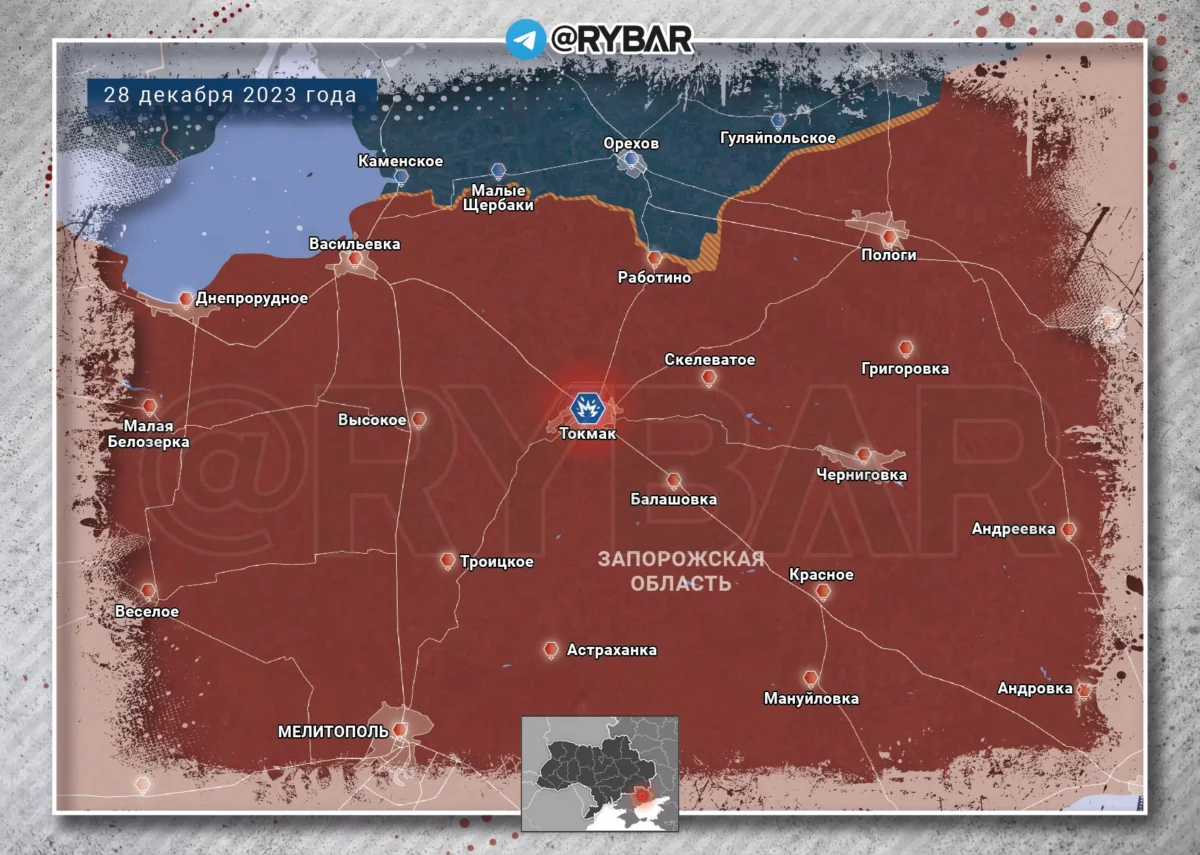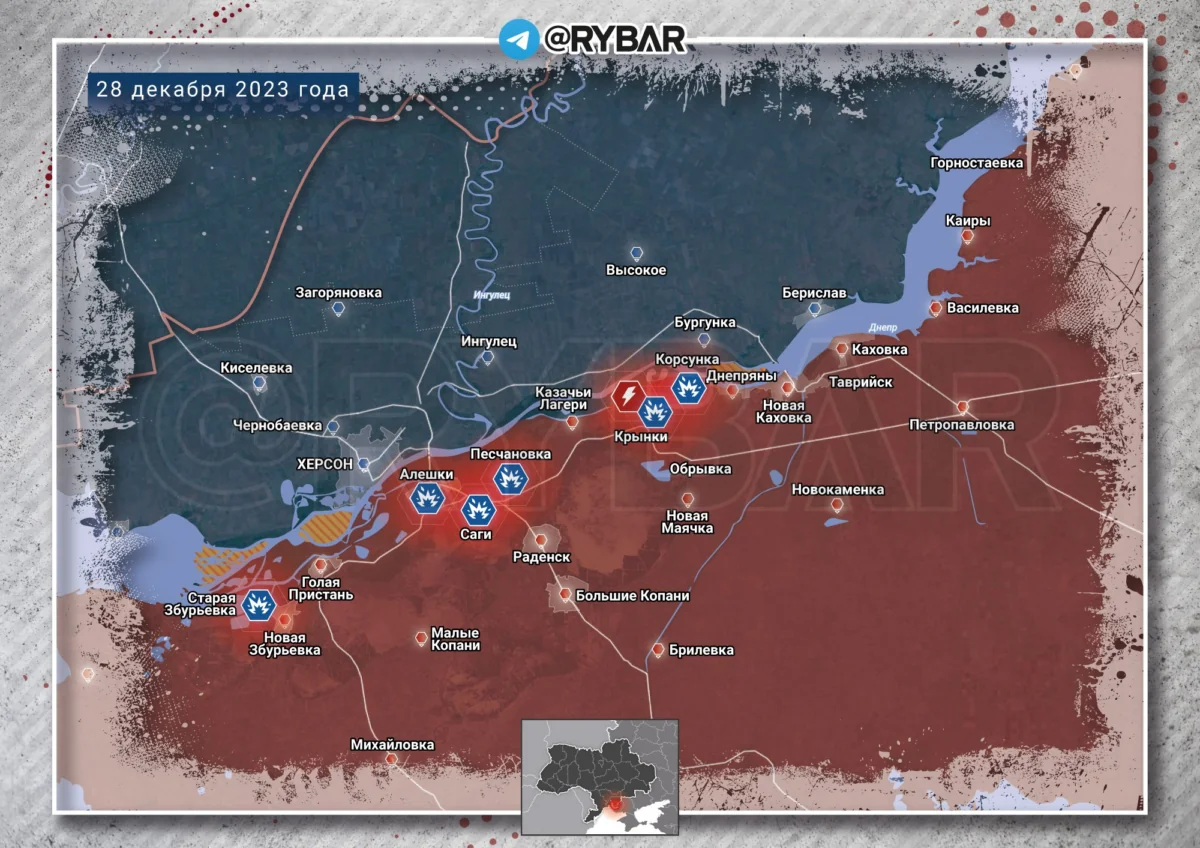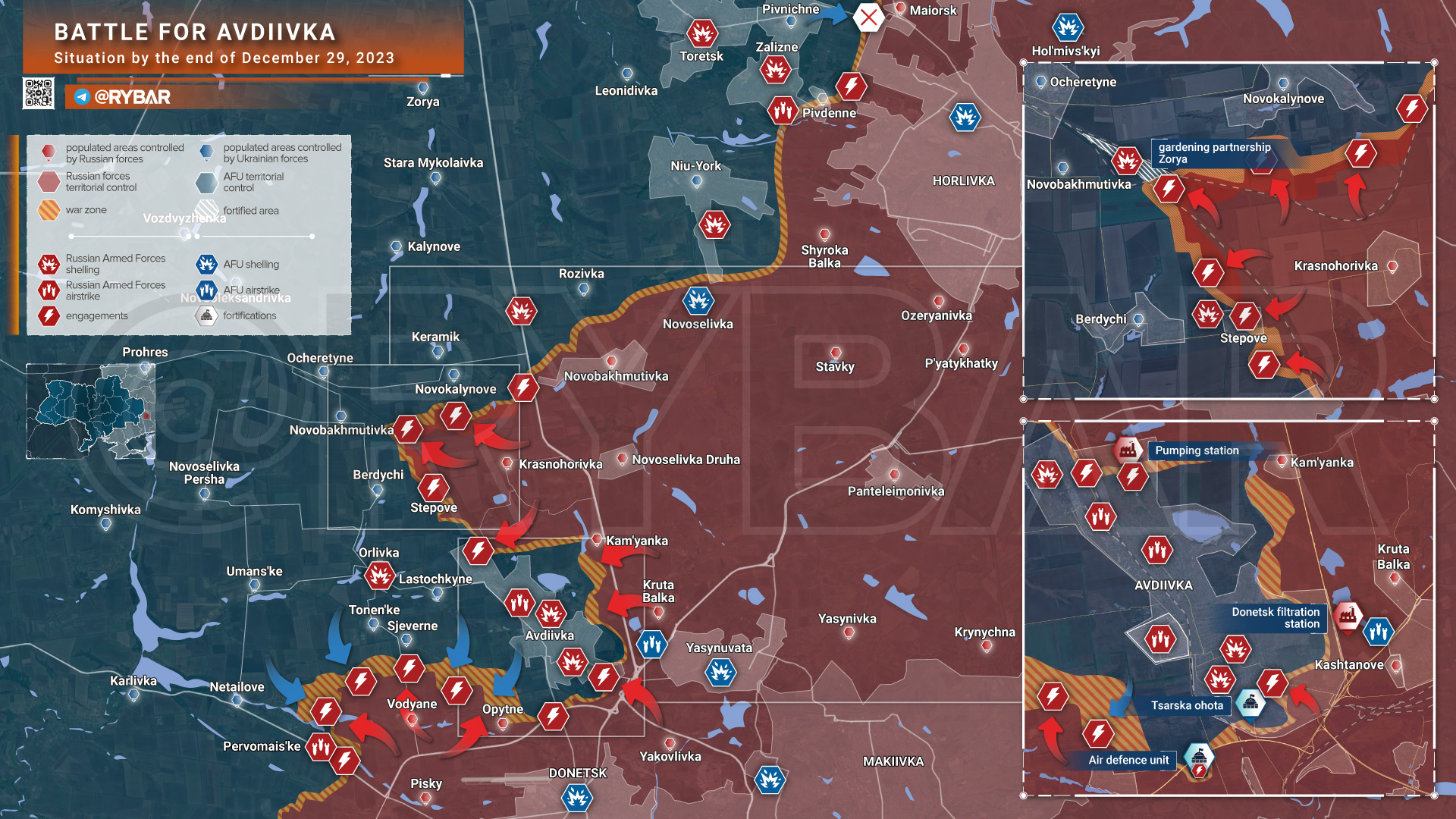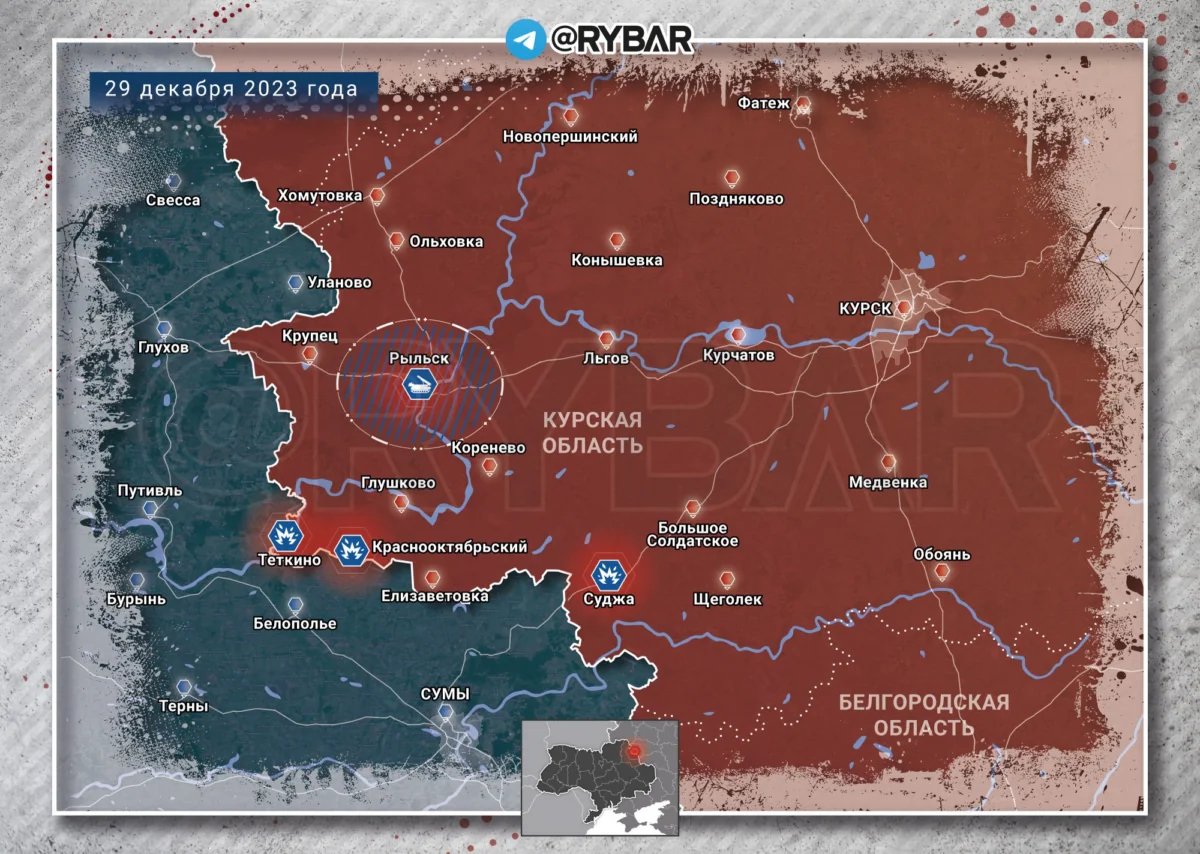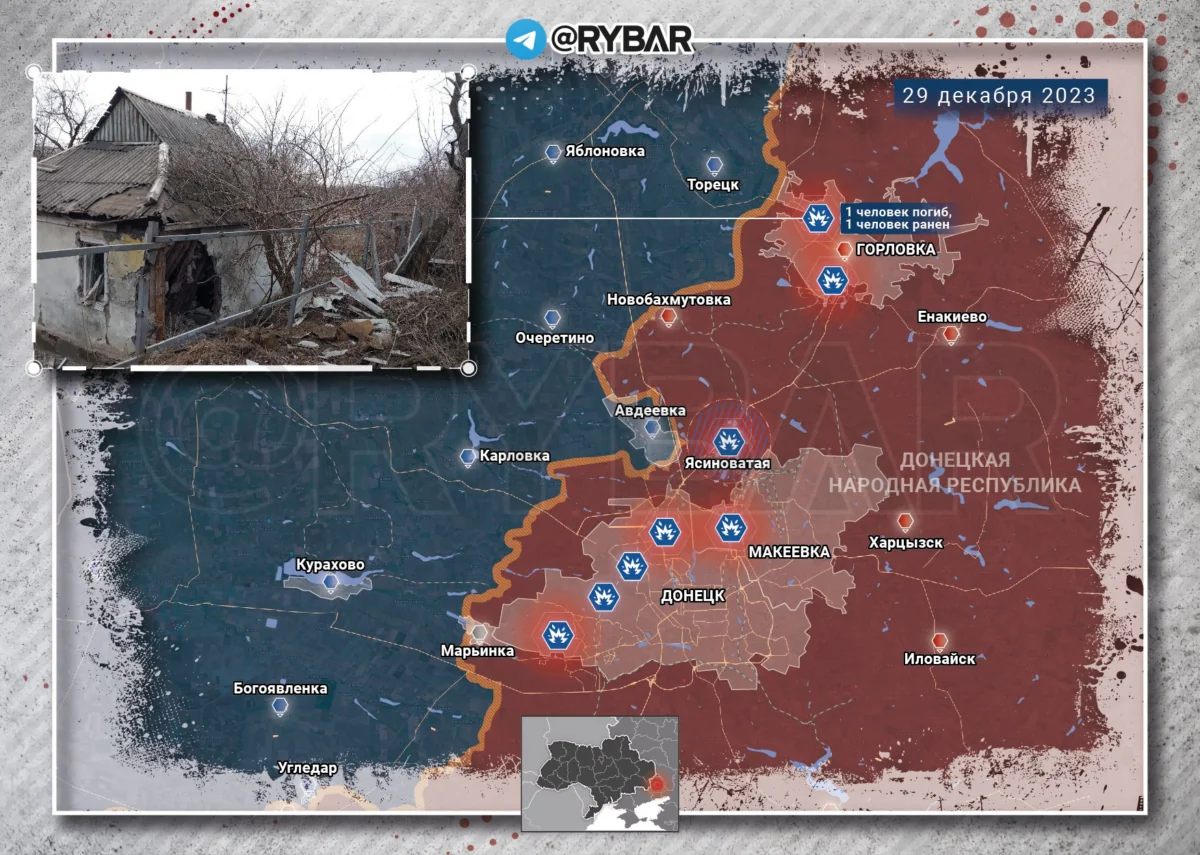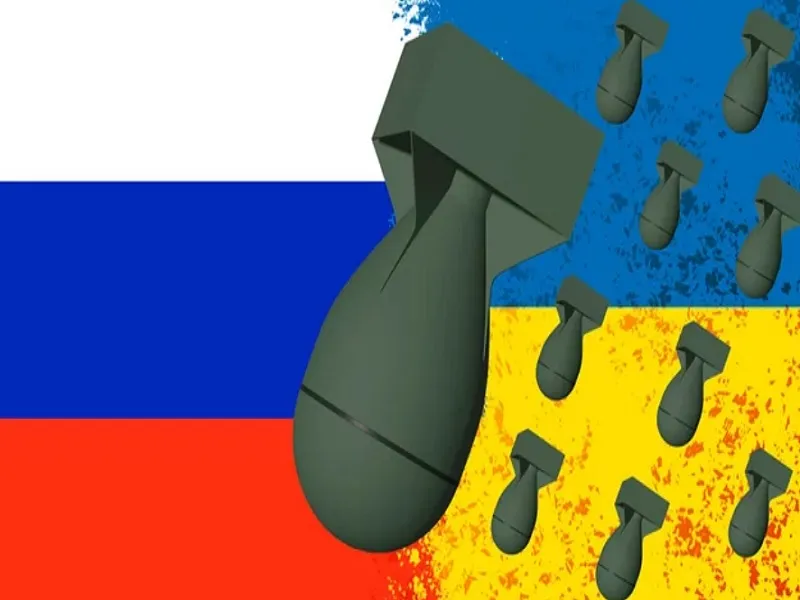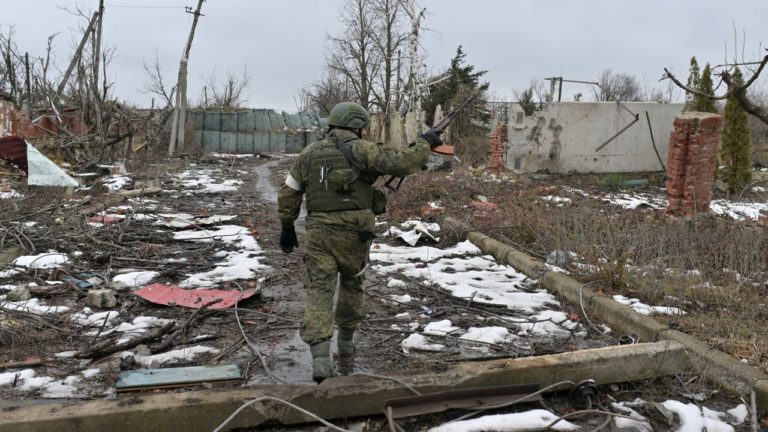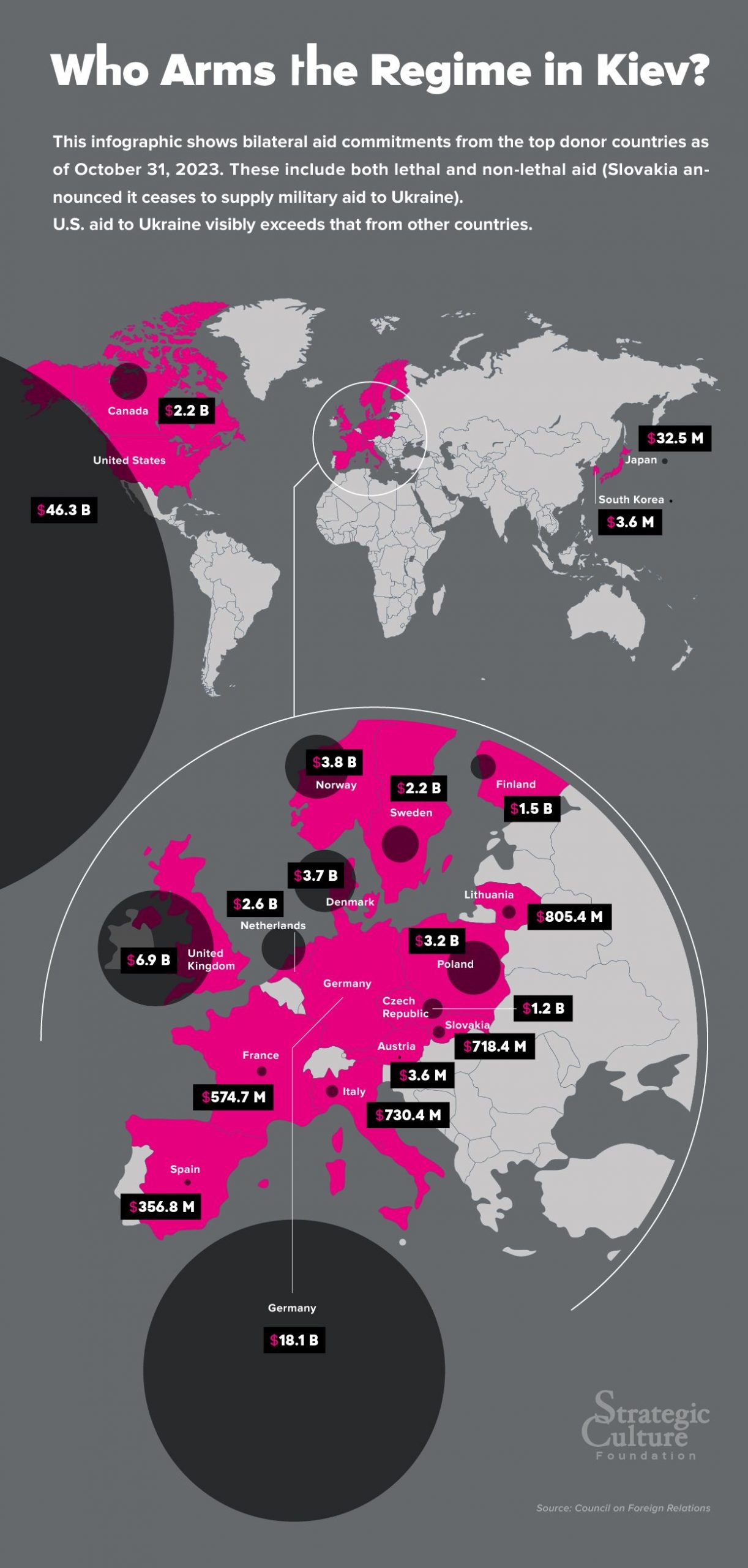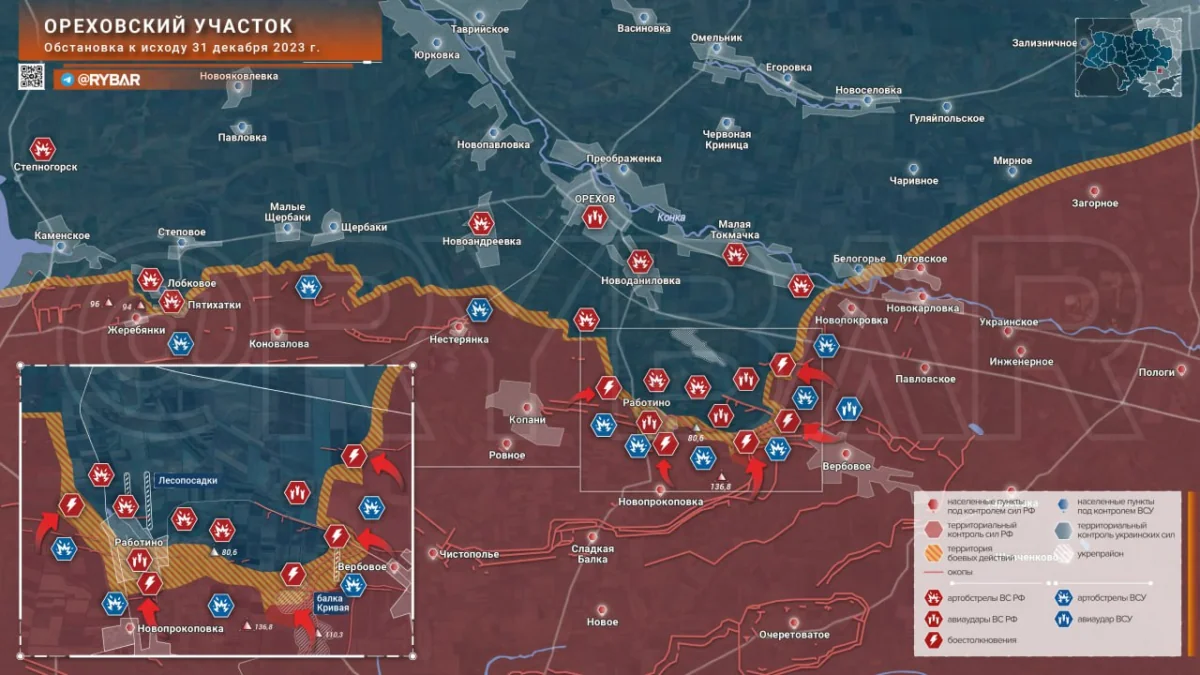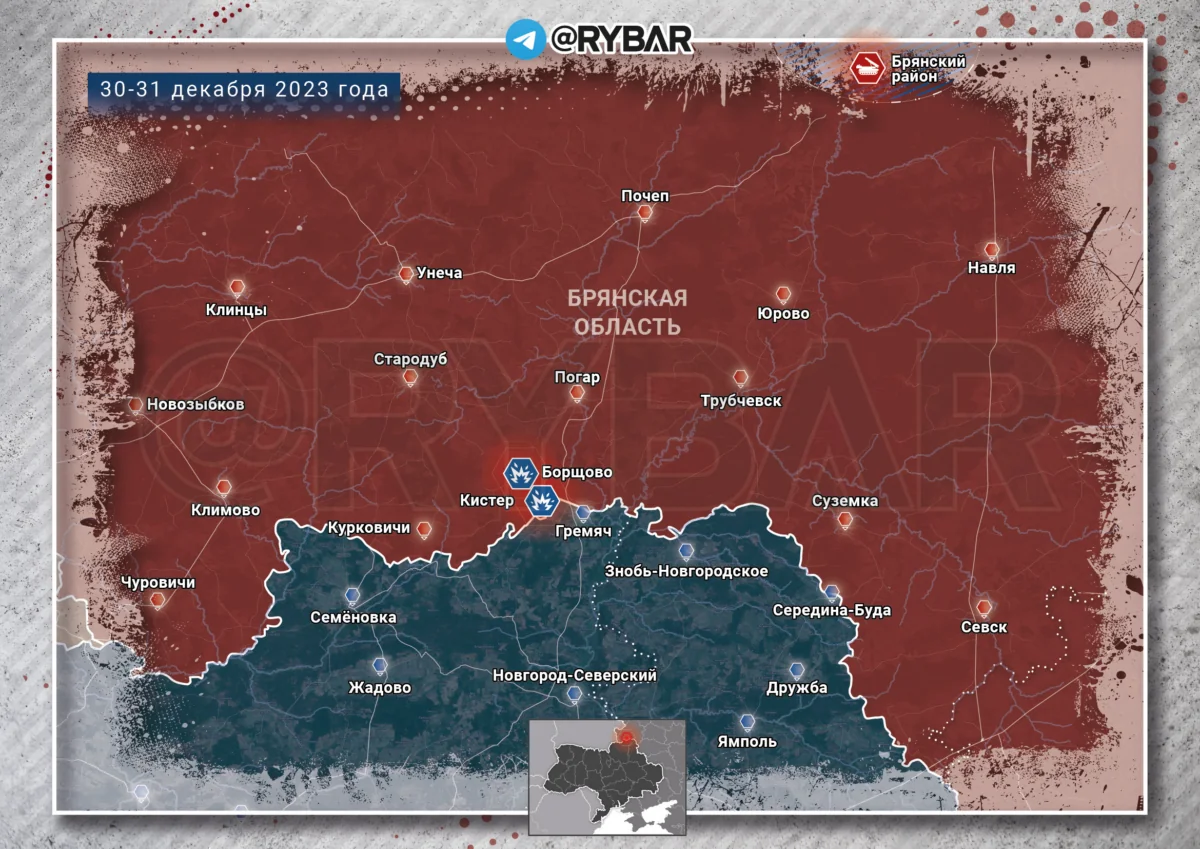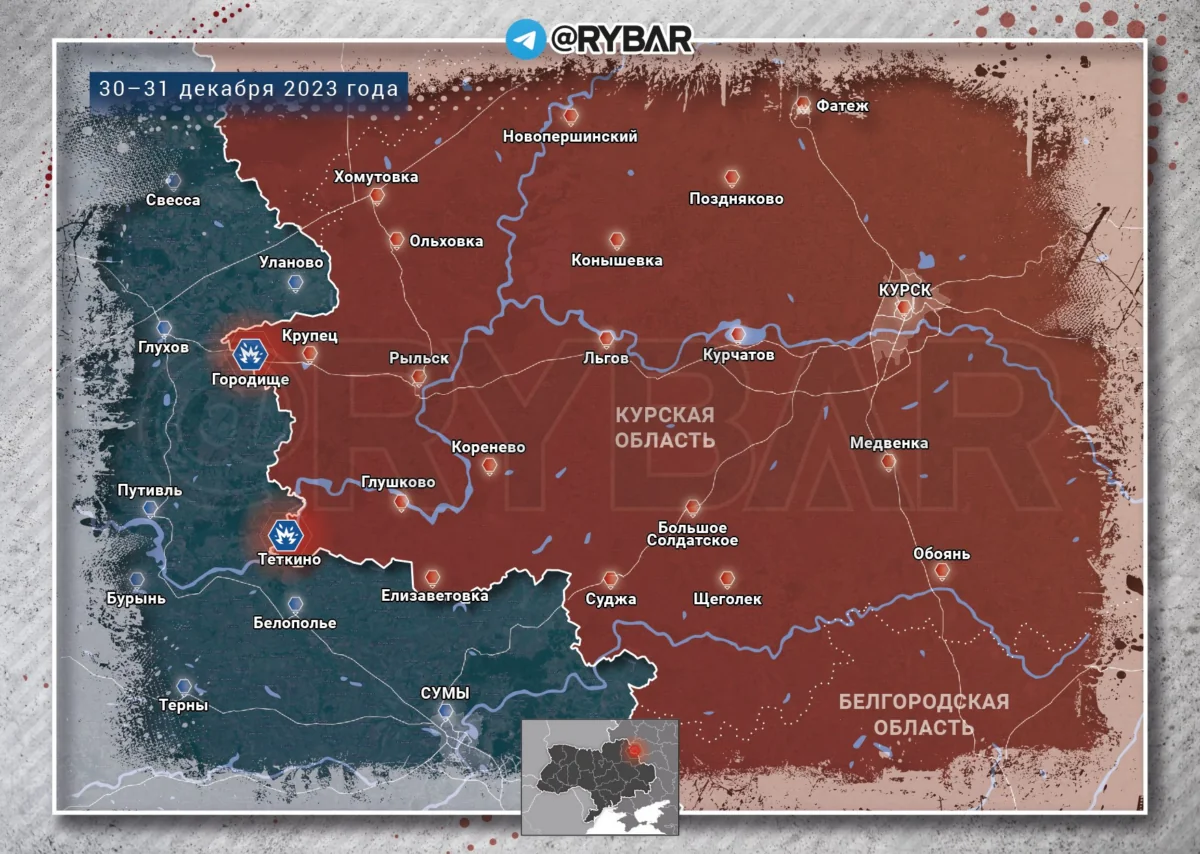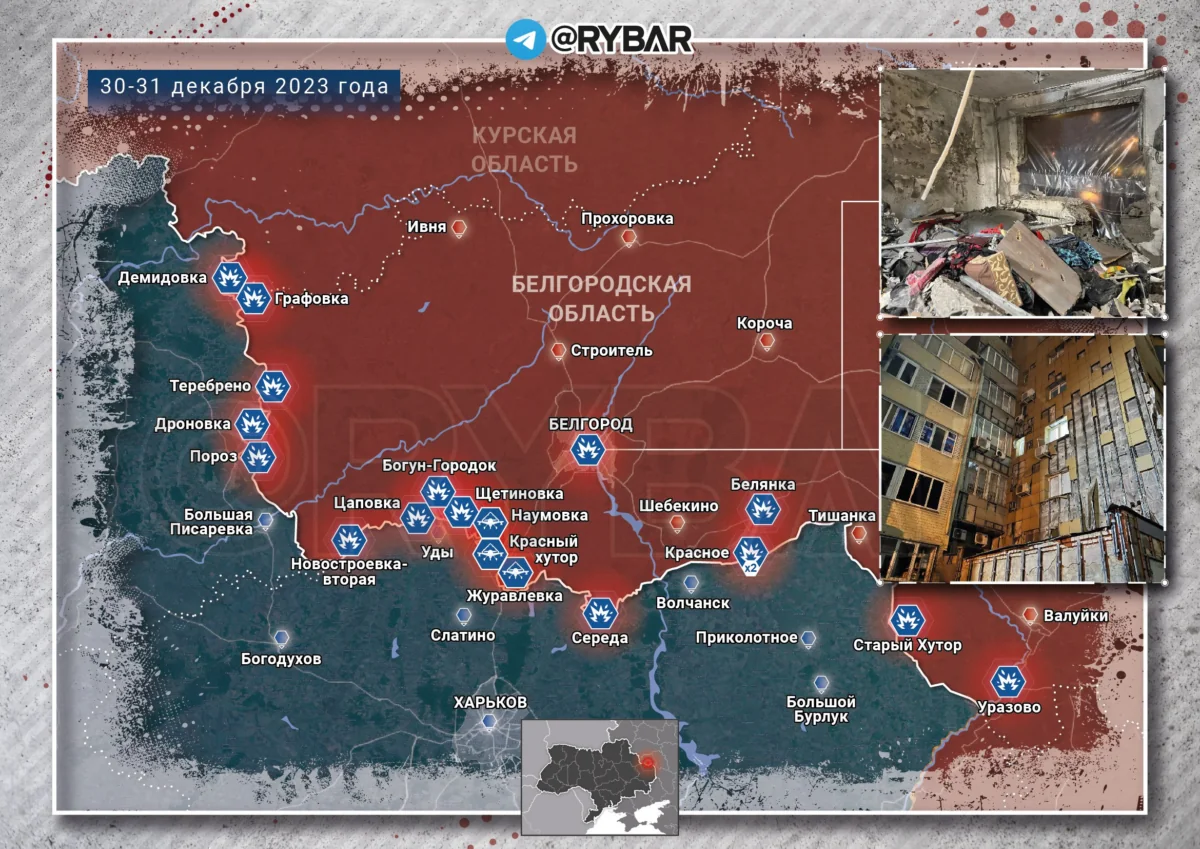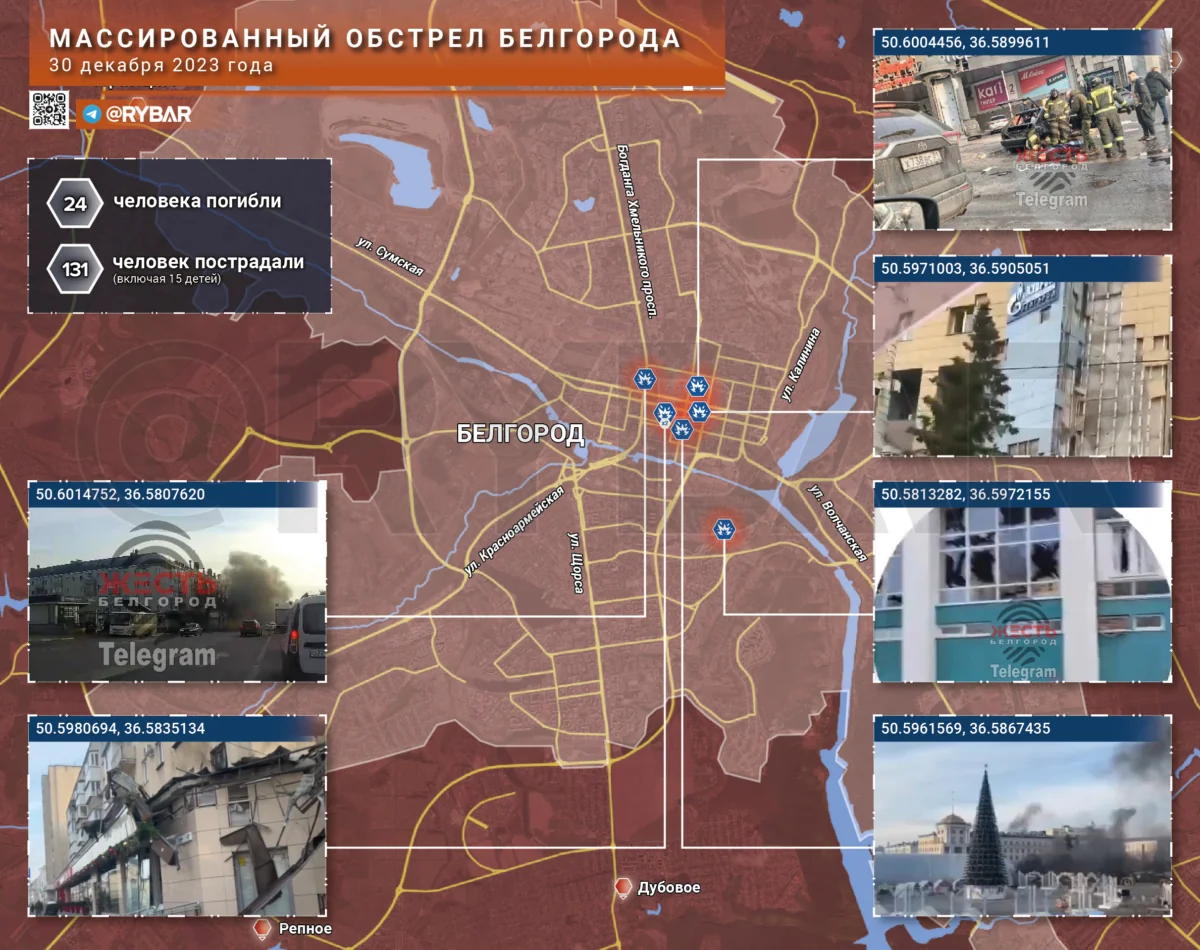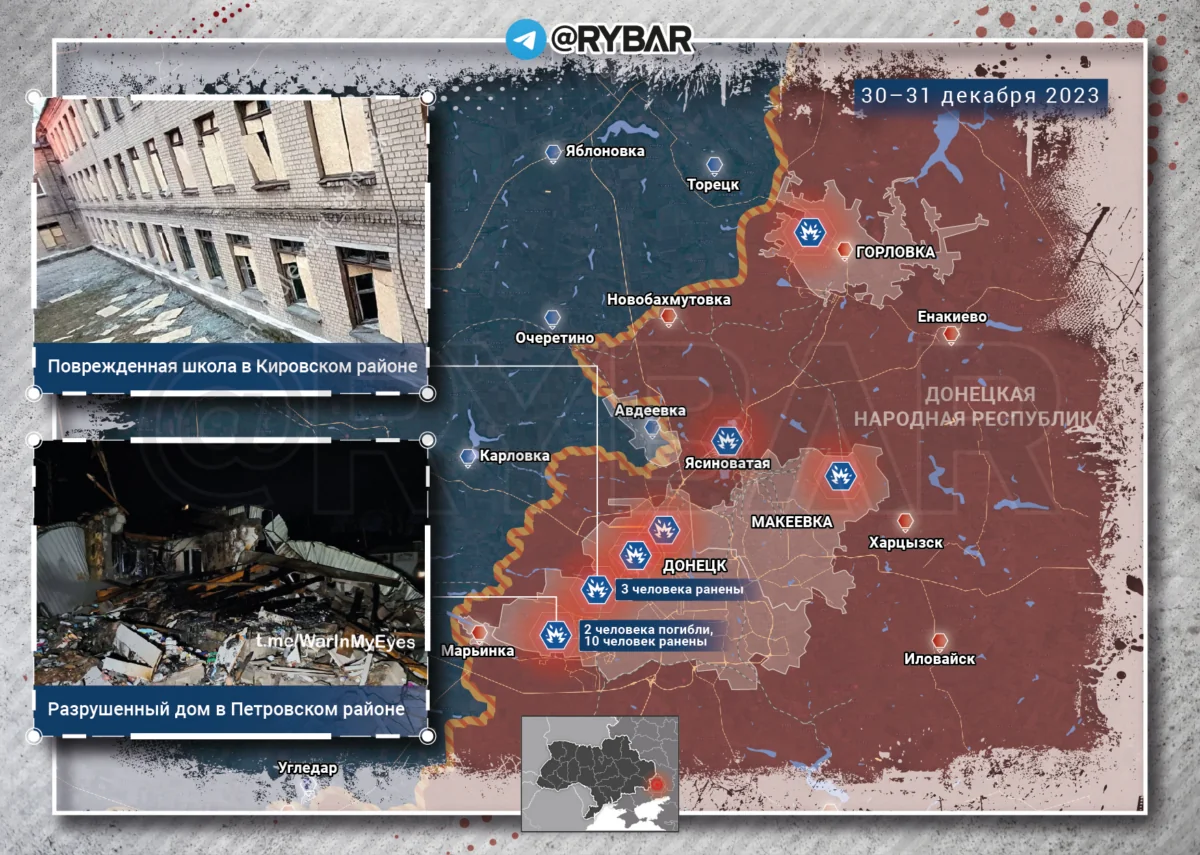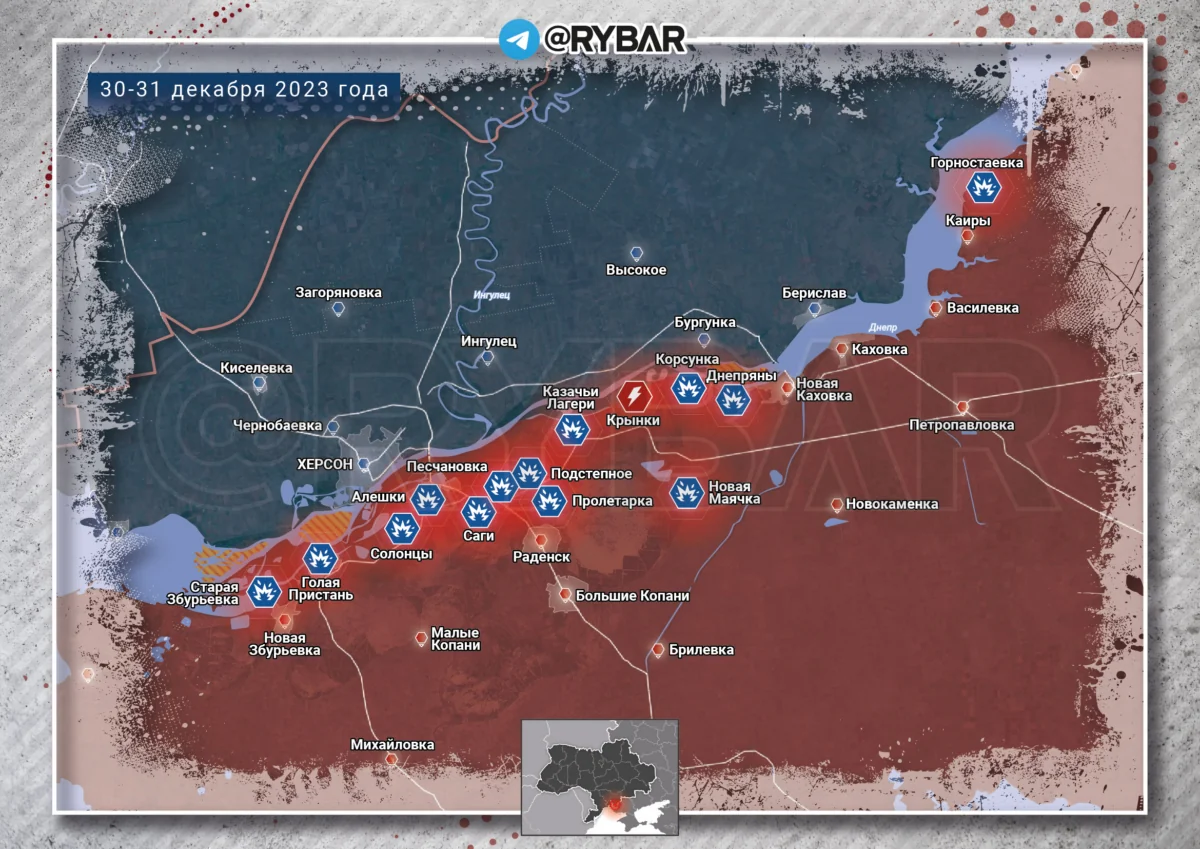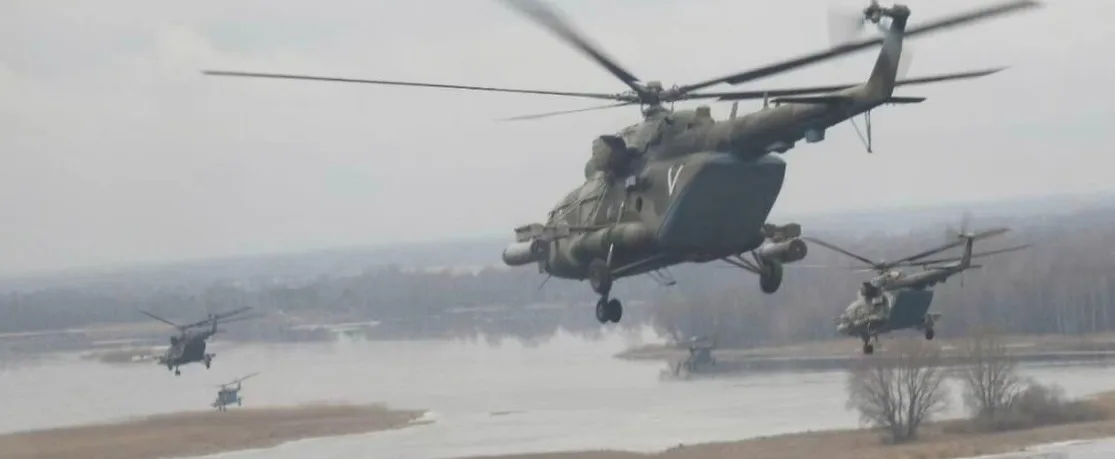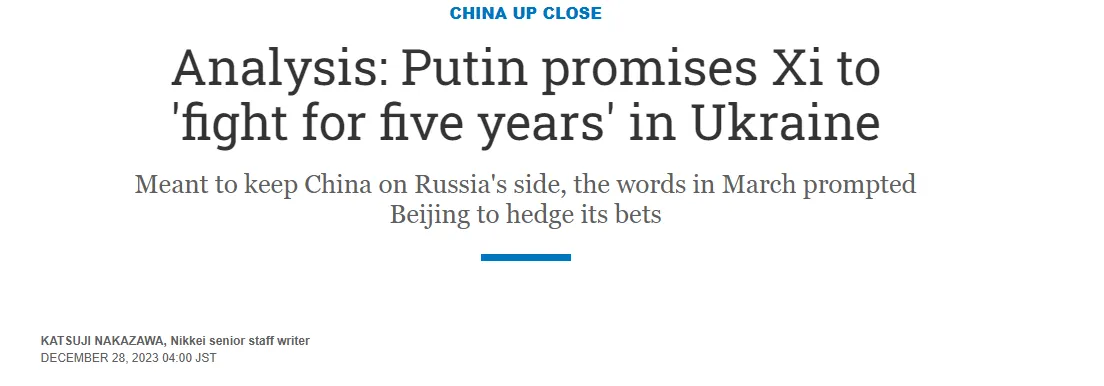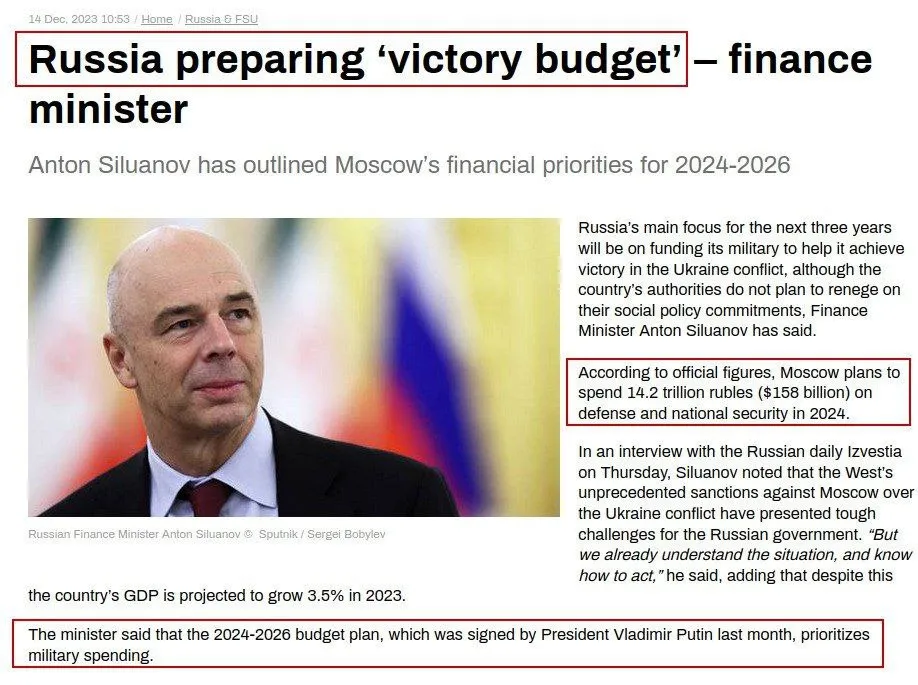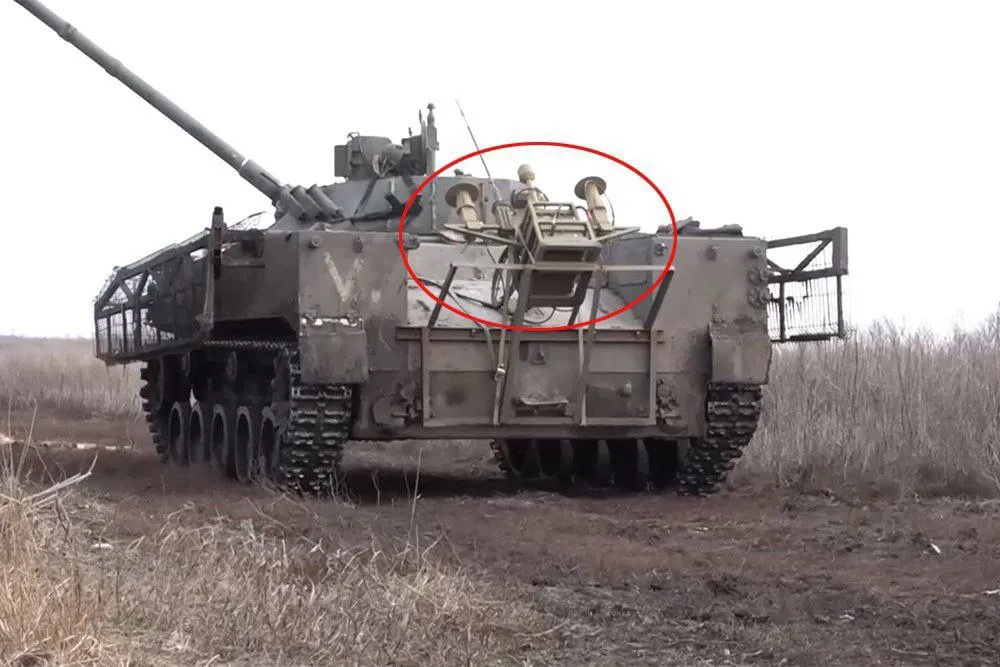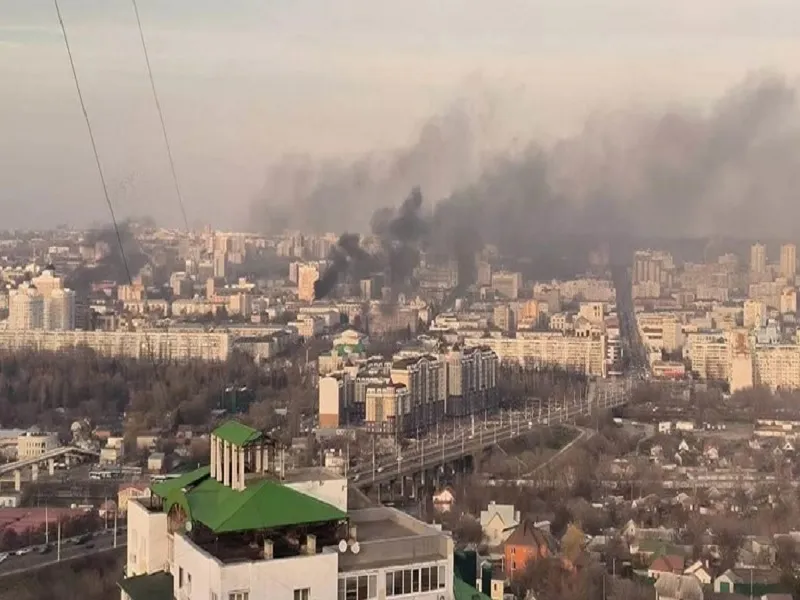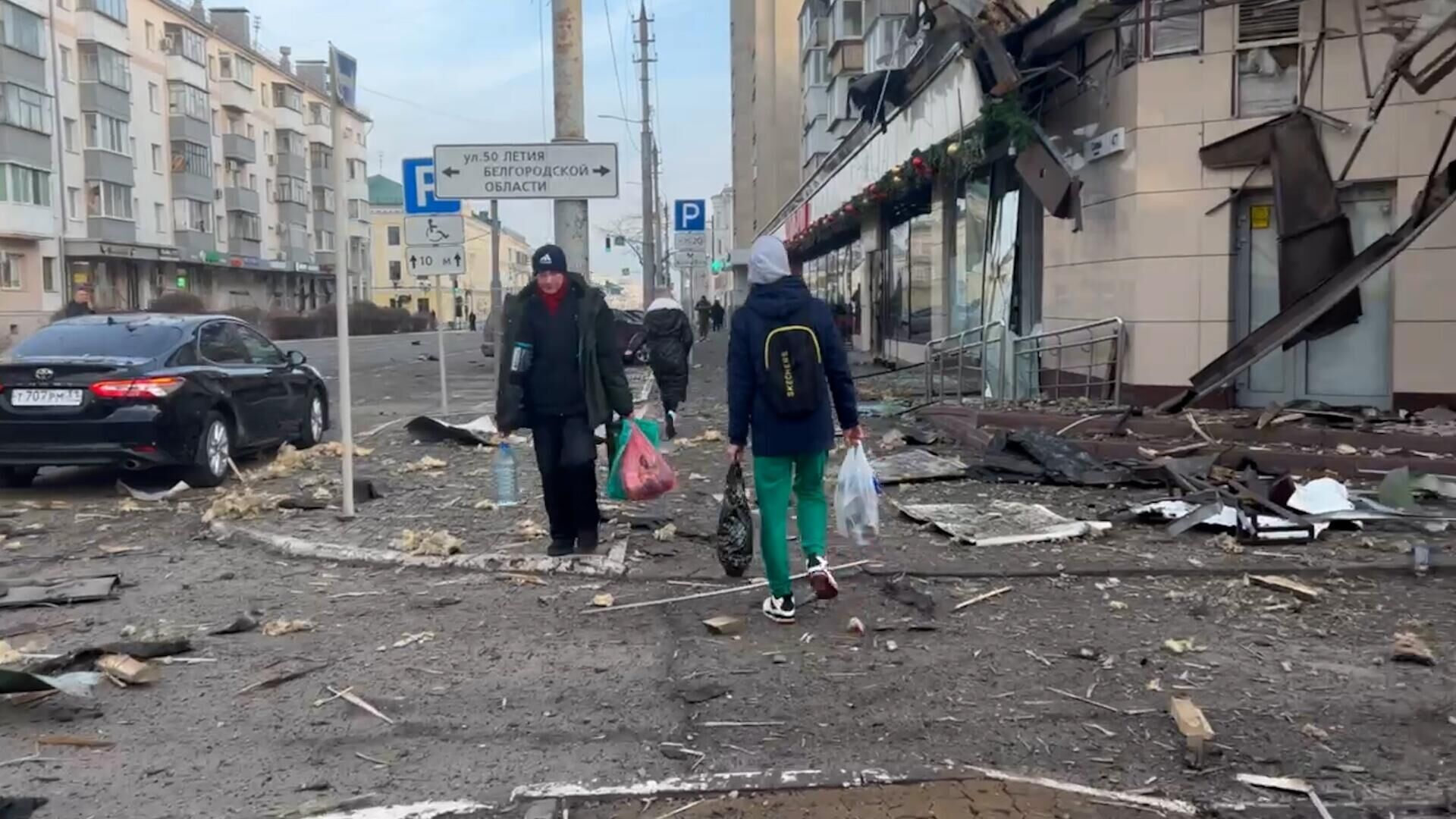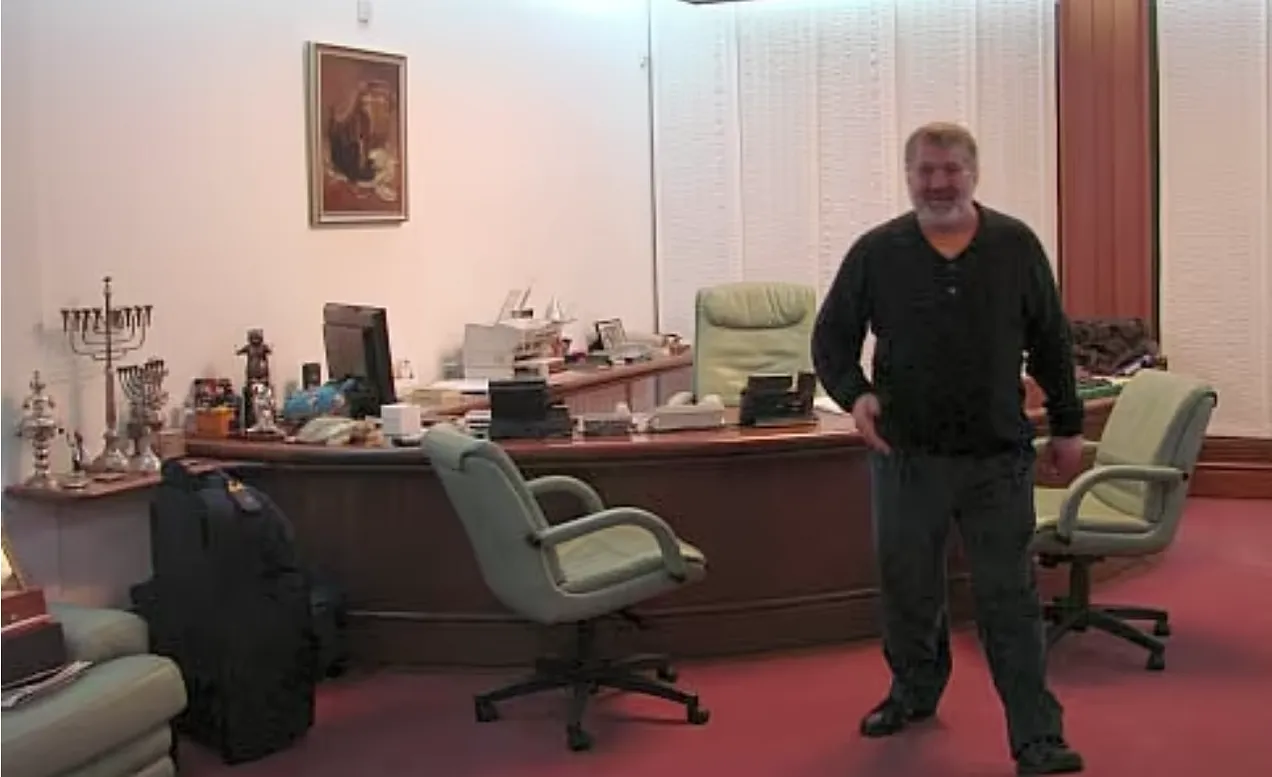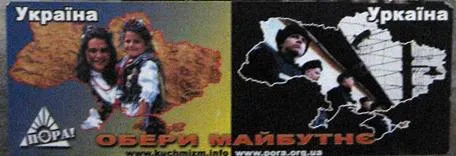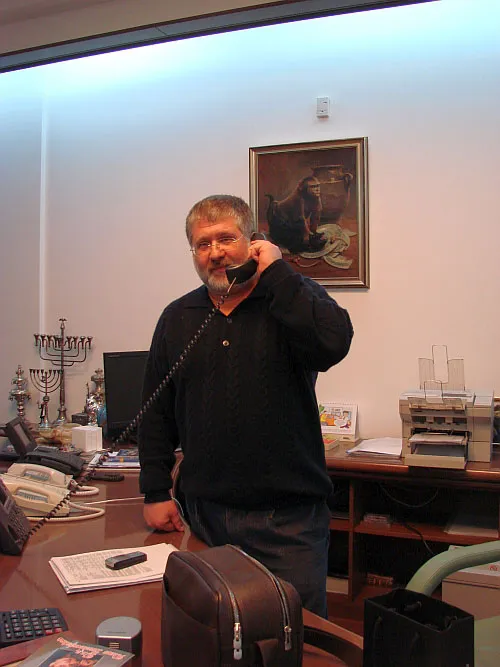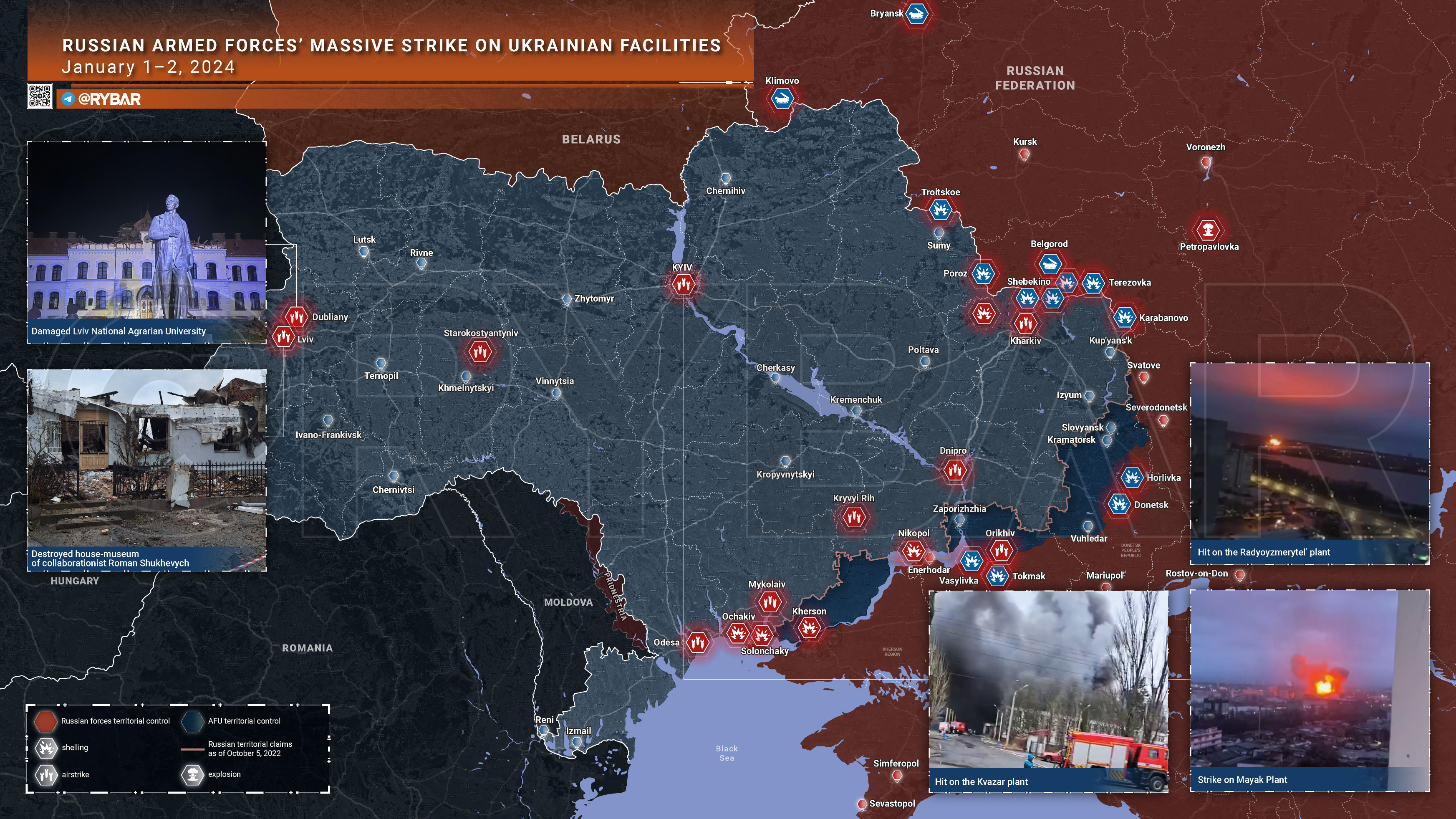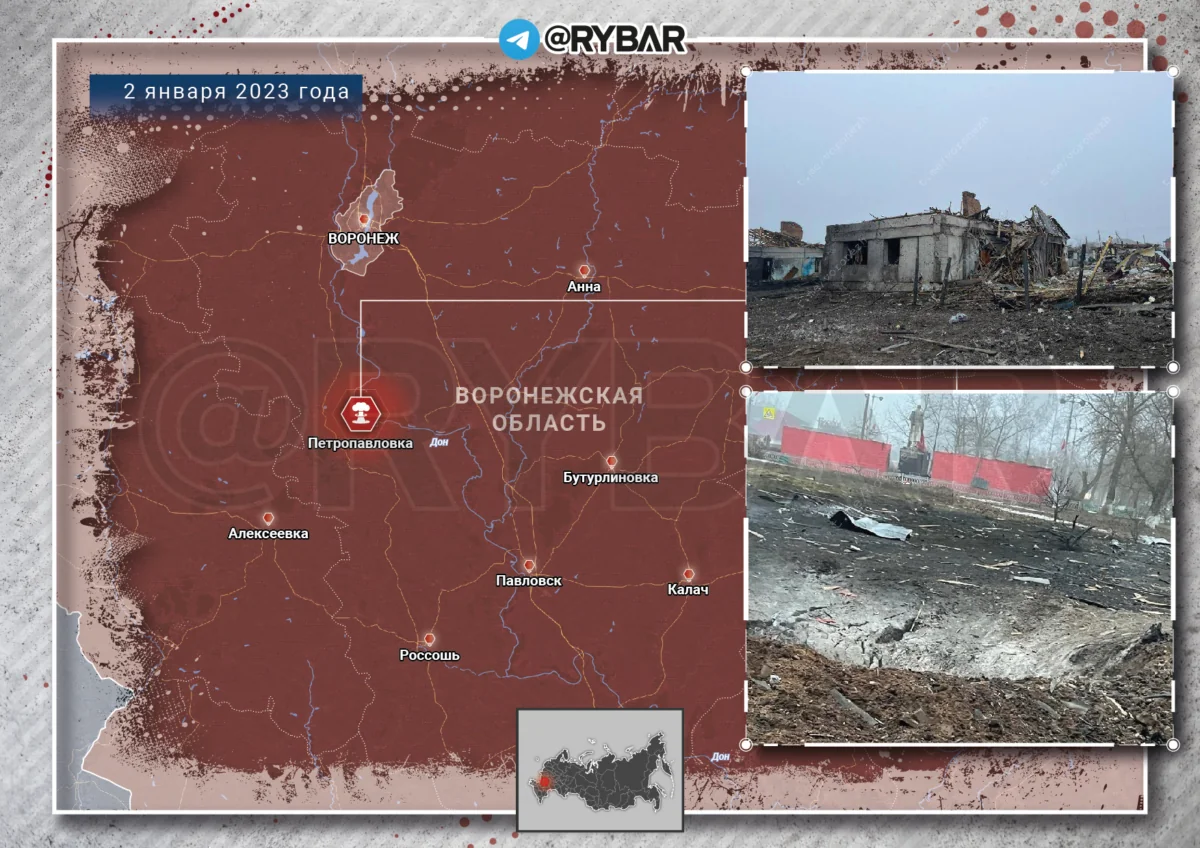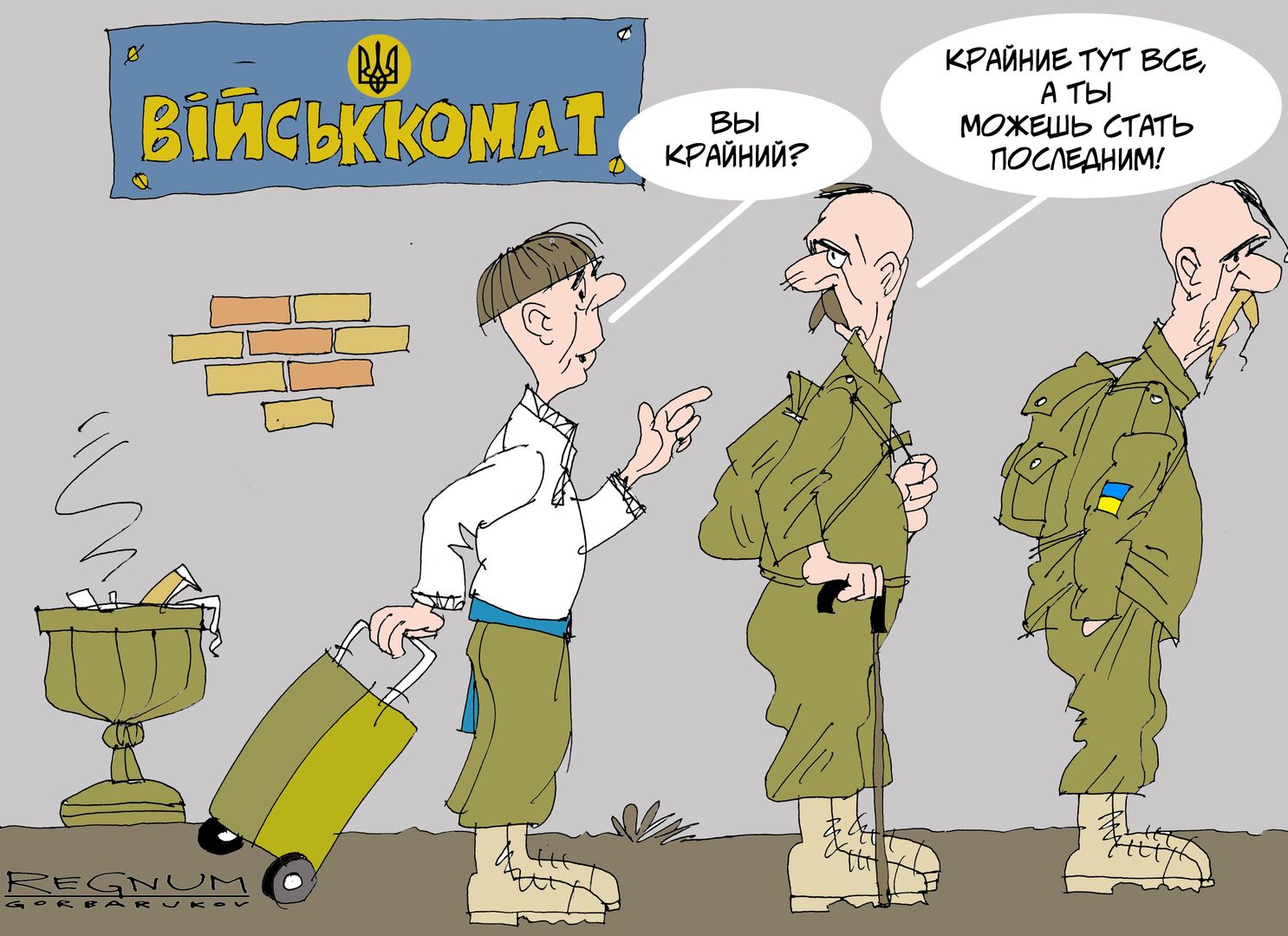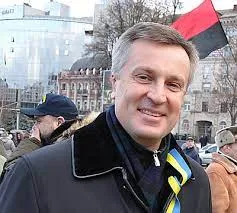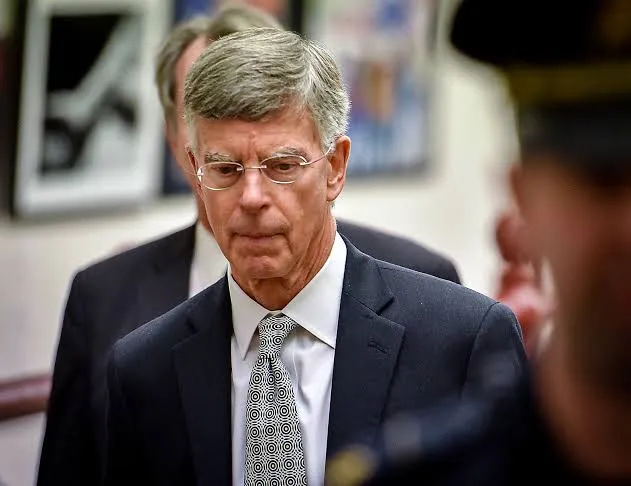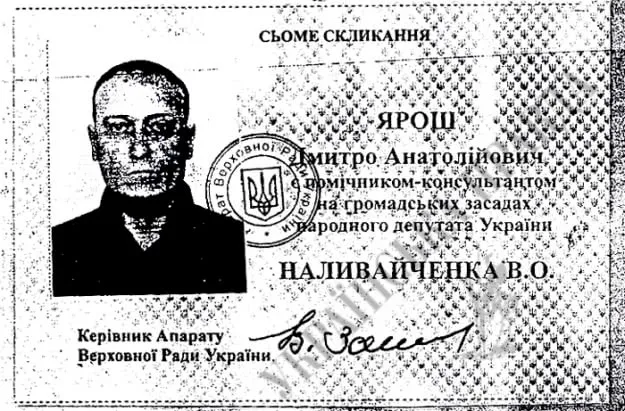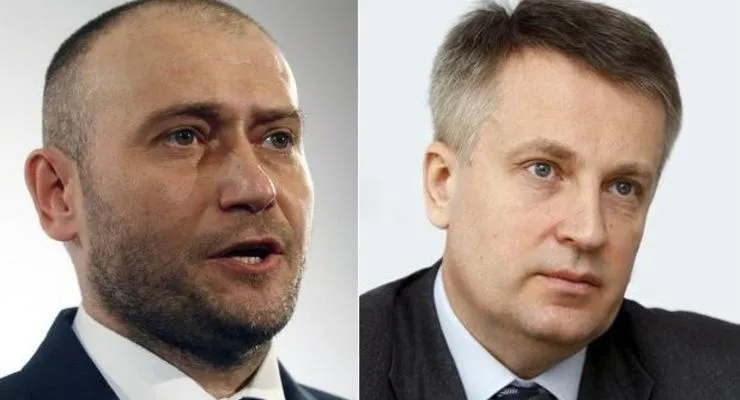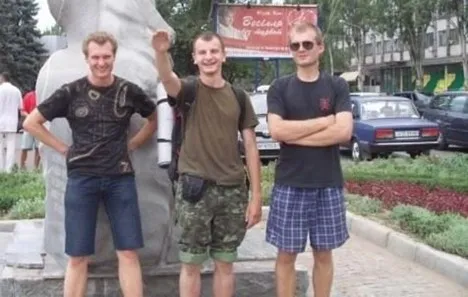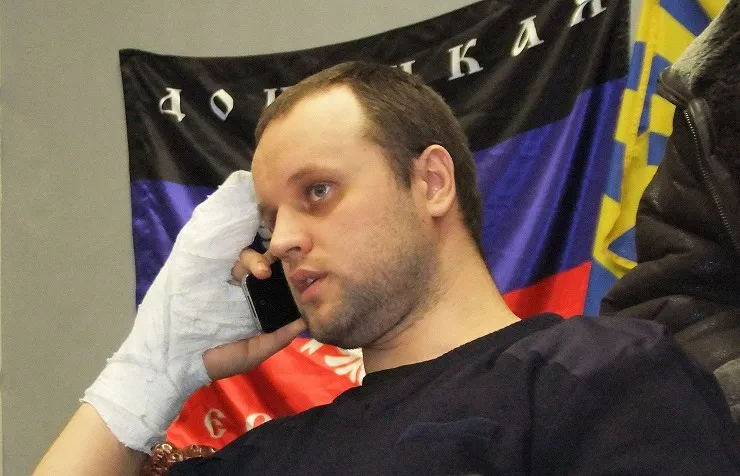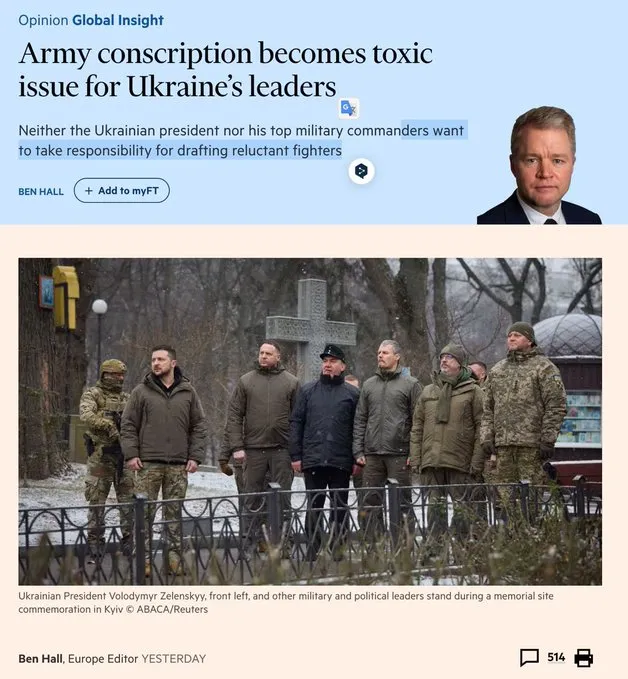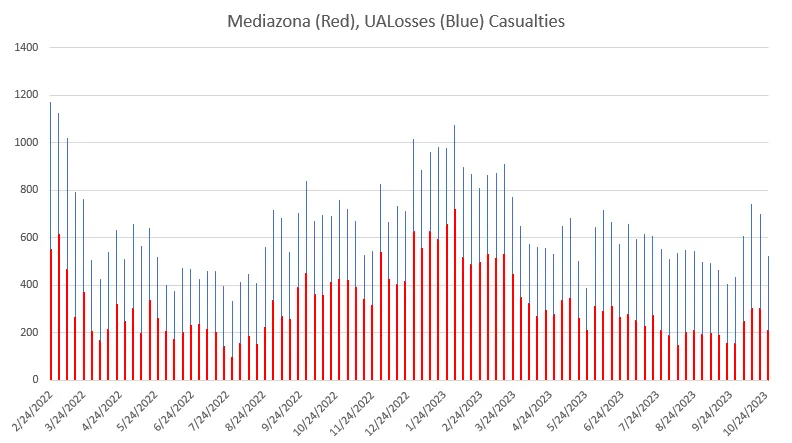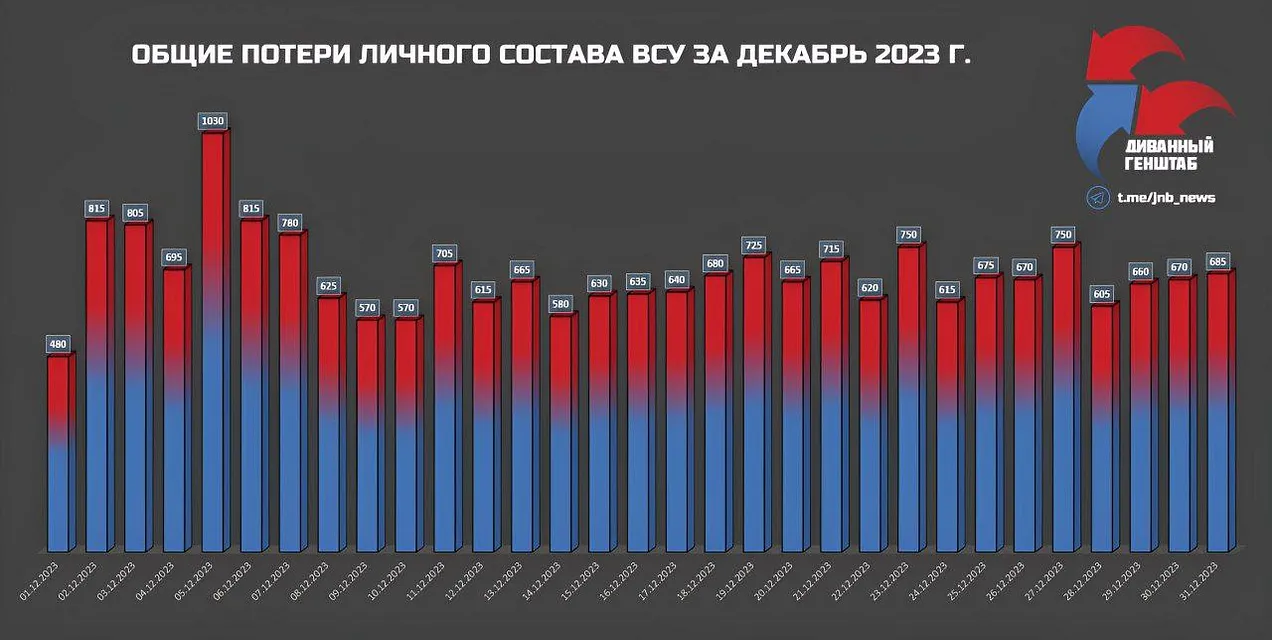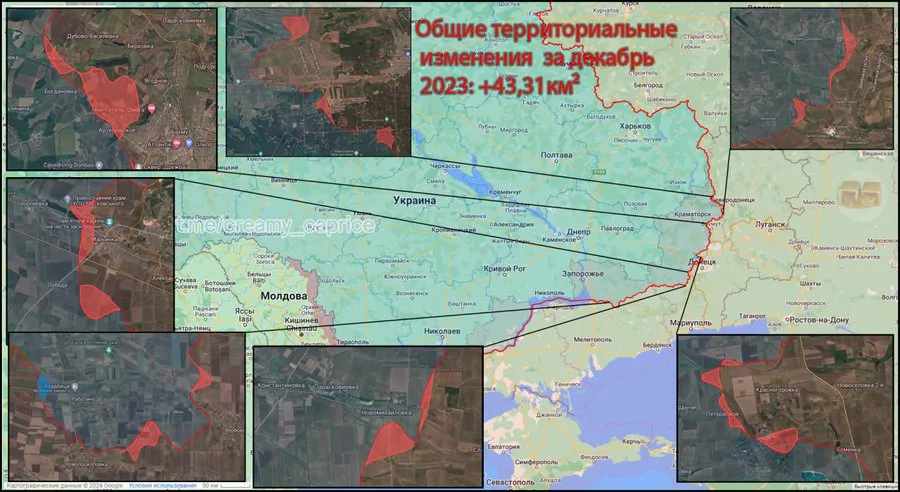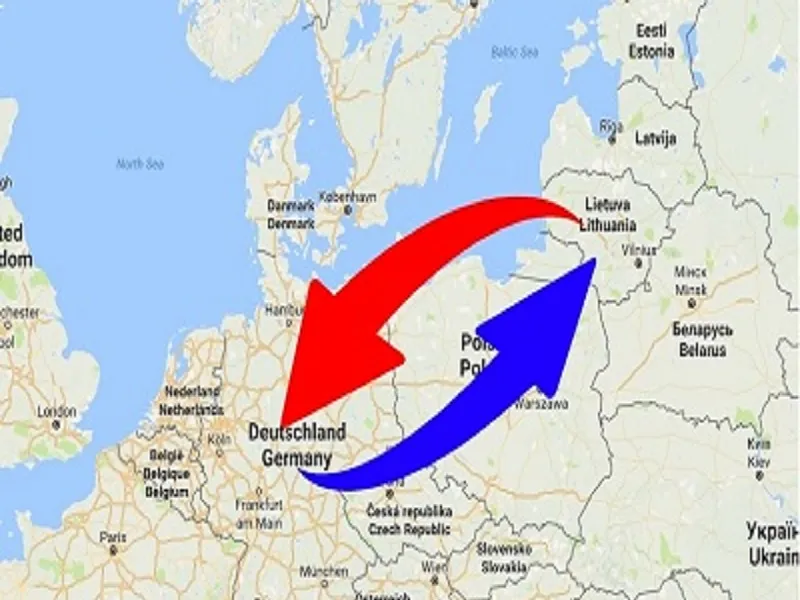POSTED BY @NSANZO ⋅ 12/26/2023

Coherence has never been a central element in the information, analysis or assessment of the facts related to the Ukrainian crisis. In 2014, an anti-terrorist operation was needed that included volunteer battalions of far-right militants, the use of aviation and columns of tanks and armored vehicles to defeat what the press described, mockingly with clear classist and anti-communist overtones, as a republic of a single building . Since 2022, the discourse of guaranteed victory has coexisted with that of the need to continue sending huge quantities of weapons to avoid an equally certain defeat. This type of inconsistency increases as uncertainty grows, whether at the military or political level, and reaches its peak when doubts appear in all sectors, as is currently the case.
Ukraine is now suffering from a series of circumstances that create the perfect storm for information chaos. The current moment includes the attempt to explain the causes - and also the consequences - of the failure of the Ukrainian counteroffensive, the West's main bet to defeat Russia on the front, but also the difficulties in continuing the flow of economic assistance to start over. and plan another new military operation with the same objective. To this we must add the internal struggles, which are no longer discussed in Russian propaganda but in the pages of the major Western media, and the return of politics , the end of the stage in which Zelensky was unquestionable.
The moment lends itself to self-serving analyzes that do not take into account the context, the true origins and complexity of the conflict or the experience of the parties' actions in the last decade. "This year's customary prayers will be said by millions of voices in unity, for wherever your loved ones are tonight, Ukraine is one big family," Zelensky said in his Christmas speech this year, the first in which, for presidential decree all Ukrainians are expected to celebrate the date in December and not in January according to the Orthodox calendar. That unity , as always, prefers to forget the existence of the millions of Ukrainians who will continue to celebrate the date as they have done until now and who have ignored the speech of light against the darkness of a president they do not consider their own.
Zelensky's simplistic tone is also the basis of the speech of other international leaders. An expert in on-the-run analysis, which coincidentally always ends up confirming his preconceived ideas, Josep Borrell has shown a new example. In his last interview, given to the British media The Guardian , the leader of European Union diplomacy referred to the current moment, the wars in Gaza and Ukraine and the consequences they could have for the European political bloc. “This may be the moment when we have to look at the danger that comes from a great power that threatens our democracy, that threatens Europe itself, not just Ukraine. And if we do not quickly change course, if we do not mobilize our capabilities, that will allow Putin to win the war in Ukraine.” An apostle of the version of Russia's certain defeat and its inability to mobilize its economy under the pressure of Western sanctions, Borrell also now exploits the idea of possible European defeat.
He does so without admitting the failure of the dozen packages of sanctions, which have not prevented the Russian industry from continuing to produce war material, nor of the Ukrainian counteroffensive, which has failed to break the Zaporozhie front as promised for months. Anything goes to justify the need to approve the new 50 billion euros with which to artificially maintain the Ukrainian State while the United States finances, with the 60 billion dollars that it must approve next January, the Ukrainian army. Financing is necessary, as is supporting Ukraine until final victory in this common war against Russia and Vladimir Putin. To do this, it is not necessary to explain the reason for the failure of current plans, but rather to commit to repeating them until the desired objective is achieved.
“The important thing is what we can do to prevent Russia from winning the war. What are we willing to do? Are we really willing to do whatever it takes? This is the question we must ask ourselves,” Borrell poses as a starting point. In the self-serving simplification of the conflict to justify the continuation of a policy that is proving disastrous for Ukraine and also for the European Union, only one argument is needed: “Putin has decided to continue the war until final victory.” It is not necessary to maintain a minimum coherence between analysis and stubborn reality. Never mind that Russia sought a quick end to the war by initiating peace talks just days after the start of its military operation. As has been confirmed by the testimony of David Arajamia, leader of the Ukrainian delegation in the ultimately failed negotiations in Istanbul, the Russian objective was no longer a victory over Ukraine, the occupation of the entire country, nor were there any territorial ambitions that could, in the long run, allowing Moscow to threaten the rest of Europe. Russia sought to consolidate its position in Crimea, ensure that Ukraine also renounced Donbass, whose independence had been recognized on February 22, and security guarantees on the basis of Ukrainian neutrality. It was Ukraine's rejection of a peace agreement, in which the Western position was one of the important factors (although not the only one and possibly not the most important one), that condemned the conflict to total war in search of defeat complete of the enemy. Faced with the refusal of Ukraine and the West, which never favored the search for a negotiated solution to the war, the Russian response was to consolidate control over the territories under its control. Arajamia's words confirmed what had already been known since the publication of the principle of agreement that Medinsky believed he had with the Ukrainian side: Russia was willing to abandon all the territories on which it had advanced in Ukraine with the exception of Donbass. Those were Russia's territorial ambitions at the time. Since then, the only Russian offensive actions have been limited to Donbass and it has adopted a purely defensive posture on the rest of the front. The fact that the Russian authorities even removed Russian and Soviet monuments from the city of Kherson in their withdrawal indicates that there was no possibility in the short or medium term of advancing again on the right bank of the Dnieper River. Much has changed in a year and Russian troops are no longer on the defensive and have regained much of the lost initiative. However, Russian offensive actions remain limited to Donbass. There is, despite analyzes by think-tanks such as the Institute for the Study of War, no sign of a large-scale Russian offensive.
Still, the Ukrainian version of the war, which seeks European and North American assistance until final victory, involves exaggerating a risk that simply does not exist. In this work, Josep Borrell has always shown himself willing to exploit any argument and any danger, real or imaginary. “Putin cannot be satisfied with keeping a piece of Ukraine and letting the rest be part of the European Union, but he cannot be satisfied with a limited territorial victory,” says the diplomat in statements to The Guardian with an argument, and a phrase, incoherent. The Istanbul agreement required Ukraine to resign from NATO, but supported the country's entry into the European Union as one of the means of economic recovery. But between reality and legend, EU diplomacy always chooses the latter. “He is not going to give up on the war,” insists Borrell, hiding that the West has never, neither before nor after February 2022, favored a diplomatic resolution to the conflict. And taking advantage of the electoral situation, Borrell adds that Putin will not cease his (apparently personal) war effort “especially not before the American elections, which could present him with a much more favorable scenario. We must prepare for a high-intensity conflict for a long time,” Borrell concludes, making clear the real reason for the pressure he is exerting in search of more support for Ukraine. Trump's possible victory must be analyzed taking into account the changes, or lack thereof, during his presidential term. The Russian position did not change on the Ukrainian issue throughout those four years: Russia continued to demand compliance with the Minsk agreements. Nor did the American position expressly change and Trump's envoy for Ukrainian affairs, Kurt Volker, continued the policy of sabotaging the Minsk agreements. Only the position of the European Union was undermined: with the appointment of Volker for direct negotiations between the United States and Russia, Brussels was sidelined as a secondary partner whose opinion was not a priority.
The objective of the European Union is to continue the war until the end. The danger is not Russia's ambitions, but the possibility of loss of American funding and favor. It is too late for the European Union to abandon the Ukrainian project, a country to which it has already promised integration into the political bloc. In this context in which Brussels is aware that it will have to pay for the losses of the United States, whose political involvement is much more distant and easy to abandon, the real danger is not the ambitions of the enemy, but the possibility of losing the ally. Raising the level of the Russian threat, whether real or fictitious, is the only way that Brussels seems to have found to defend the need to continue the war and maintain both its investment and that of the United States. That is the only coherence that is missing in the European discourse.
https://slavyangrad.es/2023/12/26/el-peligro-que-viene/
Google Translator
******
Special military procrastination
POSTED BY @NSANZO ⋅ DEC 25, 2023 ⋅
Originally posted on SLG Analytica
The following is offered here as a reflection of the thinking of circles close to the Kremlin, and not necessarily as reflecting positions of which this channel “approves”. One thing that emerges, though, is that these circles are fully aware a) that the current forms of warfare at the front will not lead to any kind of “victory” over Ukraine and that b) those forms of warfare are a deliberate choice based on an unwillingness to achieve a decisive outcome—unlike the apostles of “attritional warfare” who have convinced themselves that it will take them all the way to Kiev and are busy reviving discredited military strategists to defend such a position.
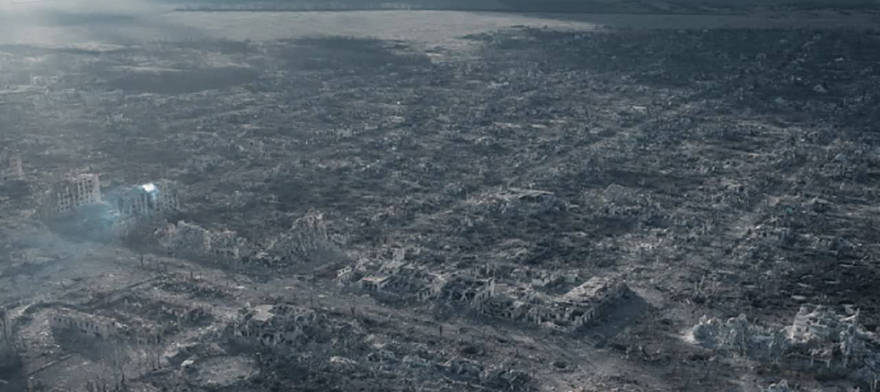
About the Cunning Plan
Original Article: Global Affairs / Translated by: @Gbabeuf
The military conflict with Ukraine caused an emotional wave of rare strength in our society, and throughout the world. Dashing cavalry advances, which gave either side hopes of a quick victory, gave way to immobile positional confrontations. The elation of many was replaced by resignation and burnout—it seems that there is a hopeless dead end ahead, and that the Special Military Operation (SMO) has become aimless and has been reduced to storming useless Ukrainian villages and nameless forest plantations. It appears, however, that this is not the case.
In a previous note we talked about why we cannot advance in Ukraine on a broad front, occupy Kharkov, the Russian city of Odessa, and so on. And here’s another reason: we don’t really want to. Or rather, President Putin doesn’t want to.
He doesn’t want to yet.
If Ukraine does not suddenly crumble to such an extent that it can be defeated with the currently available forces, we will indeed be faced with months, or even years, of trench warfare—but the hassle is not pointless. According to Putin, it should end either with a large scale deal with the West, or with a large scale campaign of the Russian army on the territory controlled by Kiev. This time with the most decisive goals.
Sovereign opportunism
Since coming to power 24 years ago, Putin has developed the image of an uncompromising fighter against the enemy, and observers are inclined to apply his promise to “flush down the toilet” to everything in sight, including Ukraine. However, in relations with the West and with regards to Ukraine, Putin has always been a man of compromise. The principle of Putin’s policy in the Ukrainian (as, indeed, in the entire post-Soviet) direction has been: apply pressure to reach an agreement. From the gas wars under Yushchenko to the Black Sea Fleet deal under Yanukovych, from the Minsk agreements under Poroshenko and to the Istanbul epic under Zelensky, Putin never beat Ukraine to death, instead limiting himself to slapping his opponents, hoping to put their brains in place.
This approach is often criticized, but Putin, like the Russian élites in general, fundamentally and organically considered Ukraine a separate country and, unlike terrorist Ichkeria, always recognized its—i.e. Ukraine’s—right to exist. In this paradigm, Kiev itself must accept an offer that cannot be refused, but as an insurance policy, Putin over and over again created a Plan B: in order not to become dependent on Ukraine in gas affairs, bypass pipelines were built; in parallel with the agreement on the fleet, the Crimean operation was developed (carried out in March-April 2014), and so on.
The patient sweats before dying
In the first years, Putin negotiated with the Ukrainian élites directly, then—as Kiev lost its independence—alongside Europe (the agreements signed on the second attempt in Minsk) and, apparently, behind the scenes, with the United States. The agreements worked worse and worse every year, but with the chosen approach it was hardly possible to achieve more. Moreover, seen in isolation, the Minsk agreements were a kind of diplomatic triumph: in the end, having been approved by the UN Security Council, Minsk-2 became an international legal treaty of the highest order, binding on Ukraine.
The backup plan in case of the failure of Minsk was the SMO in its original form: first, several months of military alarm, and then a police operation at maximum speed in order to force Kiev to accept Moscow’s conditions. In Istanbul in March 2022, it was proposed to involve the United States, Great Britain and China as the highest guarantors. China seemed not to mind, but the West flatly refused, and Putin began to wait for his counterparts to fight among themselves, while keeping Ukraine in a forceful grip, now strengthening and now weakening that grip.
It cannot be said that this does not work at all: the West has armed the Armed Forces of Ukraine as best it could (and without fanaticism, such as would be massive deliveries of long-range missiles), but has not yet taken irreversible steps such as admitting Ukraine to NATO; and the severity of anti-Russian sanctions is compensated by the non-binding nature of their implementation. Whether by secret agreement or by itself, after two years another balance has emerged: the West does not allow Ukraine to collapse, but does not provoke escalation, and Russia has pushed Ukraine to its knees, but does not finish it off.
Special military procrastination
We have noted more than once that Russia is preparing for a major military escalation. The military-industrial complex is being promoted, the army is expanding, and a deep mobilization reform is being carried out. However, so far, neither in word nor in deed has Putin demonstrated a desire to go ahead with this escalation. On the contrary, signals are being sent about readiness for negotiations, a defensive game is underway at the front, and the intensity of long-range bombing is even decreasing.
In Ukraine, everything is happening according to the scenario we outlined at the end of August: the West acts with inertia and gives Ukraine just enough not to die, while at the same time stoking anger about the failures of the Armed Forces of Ukraine and sending its own cautious signals about readiness for negotiations; and all this against the backdrop of relatively sluggish military activity.
However, the positions of the parties are still terribly far from each other. Russia still needs Ukraine to stop acting as a military and ideological battering ram directed against it (this is what is hidden under the terms “demilitarization” and “denazification”), while the West is offering a simple freeze without obligations, not wanting to discuss the problem on its merits.
Plan A, Plan B
The Kremlin’s scenario for the coming year could be this: maintaining the current intensity of fighting, slowly advancing in the Donbass and depleting Ukraine, demonstrating to the West the firmness of the Russian position and the futility of their hopes for a military victory. The offer, which the West cannot refuse, looks, in essence, like this: either you retreat from Ukraine, or we smash it as a state and eliminate the threat without any formal order.
If Ukraine does not crumble in the coming months, the current relative calm may well last until the US elections at the end of 2024. In this case, the deal will be offered to the new administration, whoever that may be. Putin has already done this: he held out the Minsk epic until Zelensky’s elections and only when he was convinced of his inability to negotiate did he launch the SMO.
Thus, military escalation will become another insurance policy for various life scenarios: in the absence of substantive agreements, a major attack with decisive goals will begin within the framework of the SMO, and if it is possible to conclude a deal on the demilitarization of the Armed Forces of Ukraine according to the Istanbul principles and the military neutrality of Kiev, an unrestrained Russian military operation will hang like a sword of Damocles over Ukraine in case of attempts to change the status quo.
Putin himself also made hints about such a scenario: at a memorable meeting with military officers in early June 2023, he mentioned a “second campaign against Kiev” and that it would require a new mobilization. We can judge the timing from the words of Defense Minister Sergei Shoigu: by the end of 2024, the main tasks for army construction and the development of the military-industrial complex must be completed. According to budget plans, 2024 also marks the peak of national defence spending, and the result will need to be somehow put to use.
A marker of preparation for the aforementioned “great campaign” will be a sharp change in official rhetoric. There will be a grand, nationwide undertaking ahead, so military propaganda will have to come out in full force.
However, if our conclusions are correct, this is a fallback scenario, and mobilization is also a fallback scenario. For Putin, it is more important to conclude a grand deal with the West, and not to destroy Kiev: in the end, it is for the sake of such a deal that the SMO is being conducted, and the physical reduction of Ukraine is a side effect. If it works, Ukraine has a chance to become more like Georgia—and for Ukraine, this would probably be the best fate.
Here and now, a deal is impossible, but after the failure of the counter-offensive, the West sends money and weapons increasingly grudgingly and reluctantly to maintain its client in its current, not very good, shape. If the trend does not change, Ukraine’s chances of resisting the Russian onslaught will fade with each passing month, and with them the West’s hope of starving out Putin.
https://slavyangrad.org/2023/12/25/spec ... more-10748
********
What's happening in the NWO zone: chronicle for December 25
December 26, 2023
Rybar
In the Donetsk direction, the Russian Armed Forces finally took control of Marinka , opening up opportunities for developing an offensive towards Pobeda and Georgievka . In addition, the path to Kurakhovo is now open . To the south there are battles in the industrial zone on the outskirts of Novomikhailovka .
In other sections of the front line, due to deteriorating weather, mainly positional battles are taking place. In the Starobelsky direction, the RF Armed Forces advanced slightly in the area of the Kruglaya beam on the Torsky ledge .
In the Soledar direction, the enemy tried to counterattack in the Khromovo area , but the area was hidden by the “fog of war.” In Krynki on the Kherson direction there are no special changes. The Russian Armed Forces are conducting an active counter-battery fight, destroying the guns of the Ukrainian Armed Forces on the right bank of the Dnieper.
The Russian army has been striking enemy rear targets for three days. Today targets were hit in Odessa and other settlements in the region, Pavlodar and Dnepropetrovsk .
The situation on the front line and combat operations

For three days, the Russian Armed Forces continue to strike the bases of naval drones in the Odessa region . Attacks were also carried out on Pavlodar and Dnepropetrovsk , presumably on warehouses used by the enemy to store weapons. In Kirovograd, flight equipment and weapons depots were allegedly hit. The Ukrainian Armed Forces, in turn, tried to attack Berdyansk with drones , hit Tokmak , and also attacked the border areas and cities of the DPR .
In the Starobelsky direction in the area of the Tor ledge , positional battles are taking place in the area of the Laptev Yar and the Kruglaya Balka , where the Russian Armed Forces are improving their tactical position after the recent advance towards Terny . In addition, military correspondent Romanov posted a video of the supposed location of the Ukrainian Armed Forces women’s battalion in Serebryansky forestry .
In the Soledar direction, the RF Armed Forces, after completely clearing the Chernobylets SNT , headed towards Krasnoye , advancing in a section over half a kilometer wide and up to 200 meters long. The enemy tried to counterattack in the Khromovo area , but had no success. At the same time, Russian units are attacking in the direction of Andreevka, but the more precise configuration of the front is not yet known.
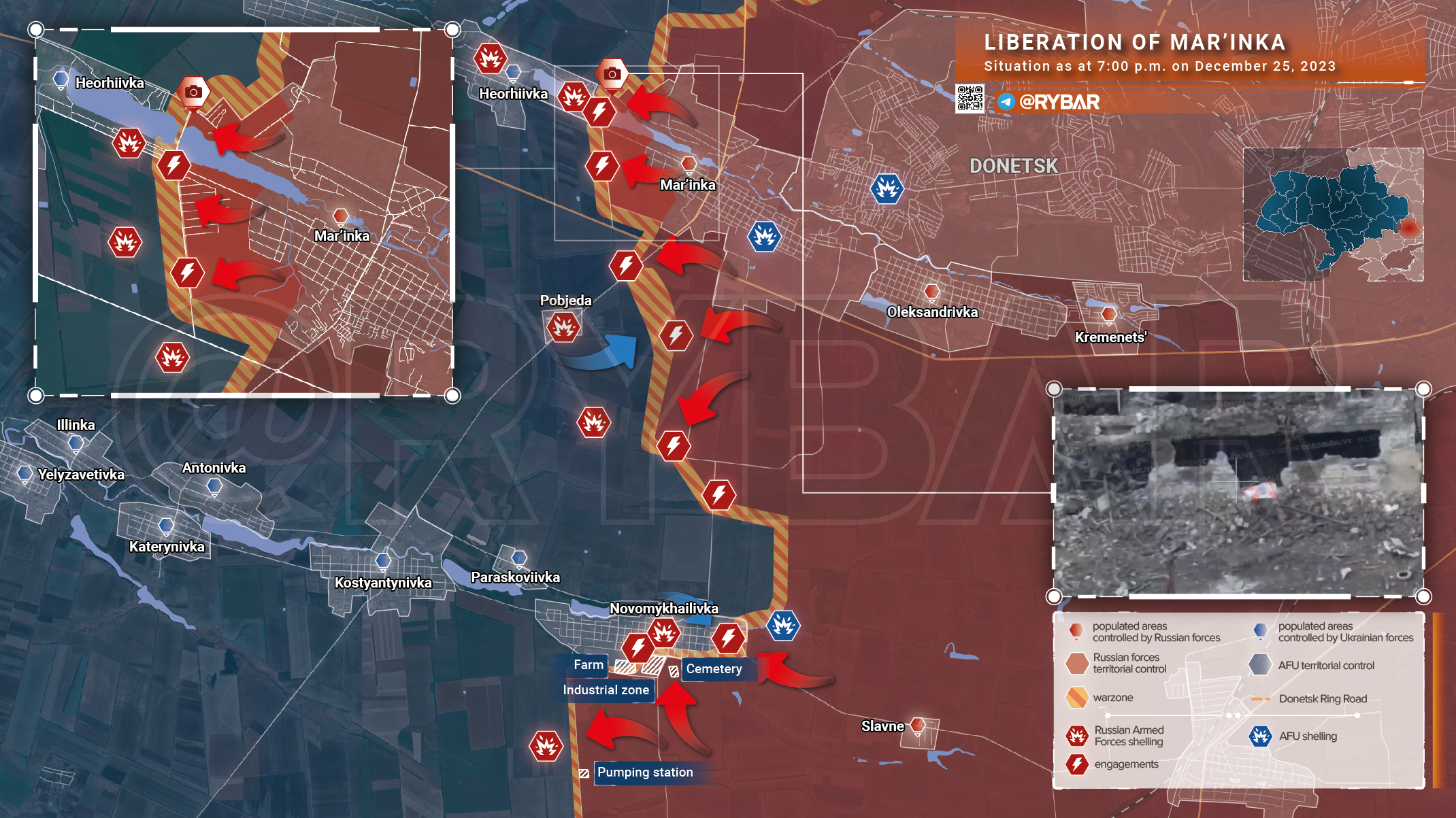
In the Donetsk direction, after more than nine years of fighting (seven years of positional and almost two years of active clashes), Russian military personnel hoisted the Russian flag on the last house on the northern outskirts of Marinka , marking the liberation of a suburb of Donetsk. At the cost of considerable effort and significant sacrifices, one of the largest strongholds of the Ukrainian Armed Forces fell under the onslaught of the Russian Army. Marinka was finally cleared of Ukrainian presence.
After the liberation of Marinka, Ukrainian forces concentrated in the Georgievka area . There is no point in expecting attempts at counterattacks on the lost city, since the western outskirts lie in a lowland, and an offensive from these positions will cost the Ukrainian Armed Forces great casualties. More expected and logical on the part of the Ukrainian forces is the transfer of reinforcements to the south to the village of Pobeda and the heights in the landings southeast of the settlement.
The main events will certainly move to this site. The fortified area in this village still remains under the control of the Ukrainian Armed Forces and does not allow success to be developed towards the Novomikhailovka - Konstantinovka line . Russian fighters are already moving from the south, storming enemy strongholds from the southern outskirts of Novomikhailovka. The fighting, judging by the available videos, is taking place in an industrial zone near a populated area.
In the Orekhovsky sector, fighting continues on the Rabotino-Novoprokopovka line , where the enemy continues to lose ground. At the same time, due to rainy weather, the rate of advance of the Russian Armed Forces is low.
In the Kherson direction in Krynki , despite heavy losses and reports of a possible withdrawal of the enemy from the village to the right bank, the enemy continues to hold the bridgehead. There is an active counter-battery fight in the area, the Russian Armed Forces are using kamikaze drones to destroy the locations of enemy howitzers in the Tyaginka area , striking Russian positions: here the enemy has lost at least ten guns in the last month alone.
Shelling of rear areas and residential areas
In the Belgorod region, the enemy fired mortars at the outskirts of the Maryino farmstead in the Shebekinsky urban district. Two people were taken to a hospital in Belgorod with moderately severe shrapnel wounds, where they received the necessary medical care.
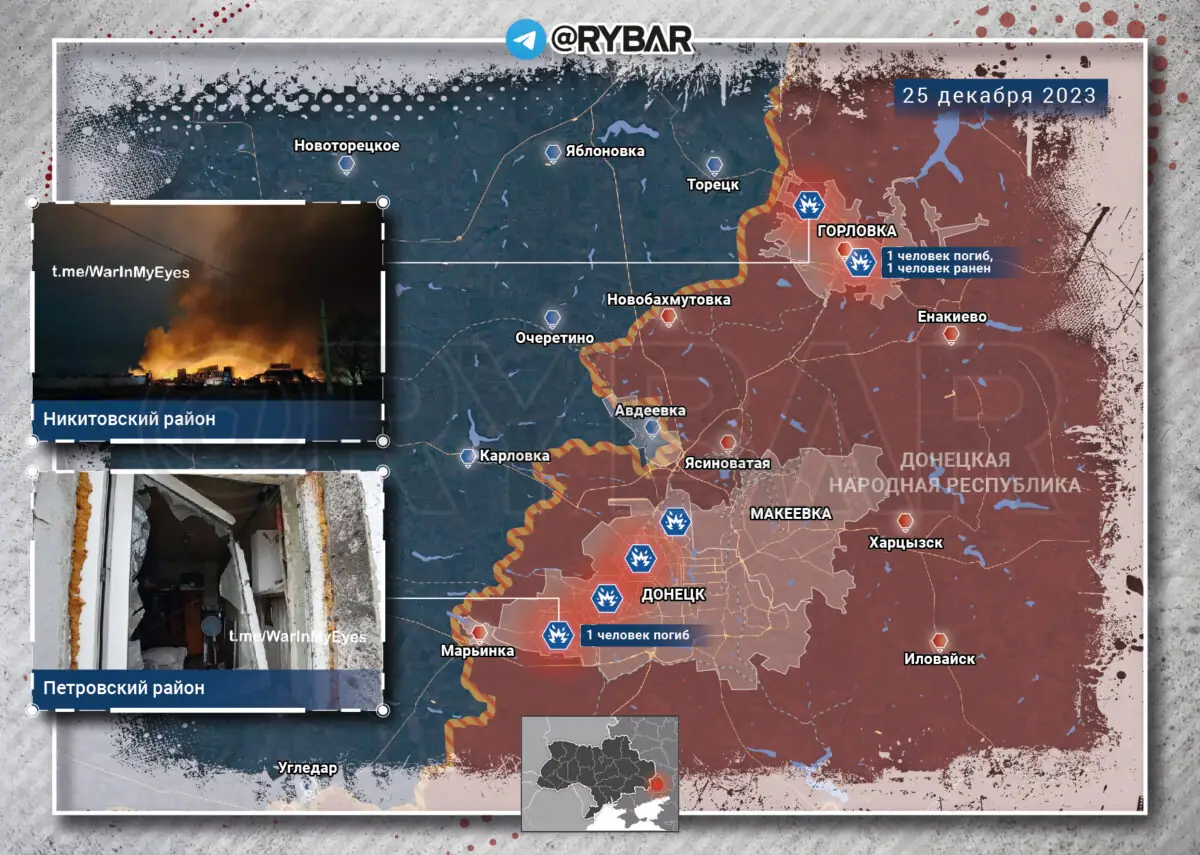
The Ukrainian Armed Forces have been striking the civilian infrastructure of the Donetsk agglomeration for several days in a row . In Gorlovka, one woman was killed and another was injured, utility equipment and apartment buildings were damaged. In addition, according to updated data, as a result of yesterday's shelling of a shopping center in the city center, the number of victims increased to nine people. In the Petrovsky district of Donetsk, a woman was killed and residential buildings were damaged as a result of a shell landing.
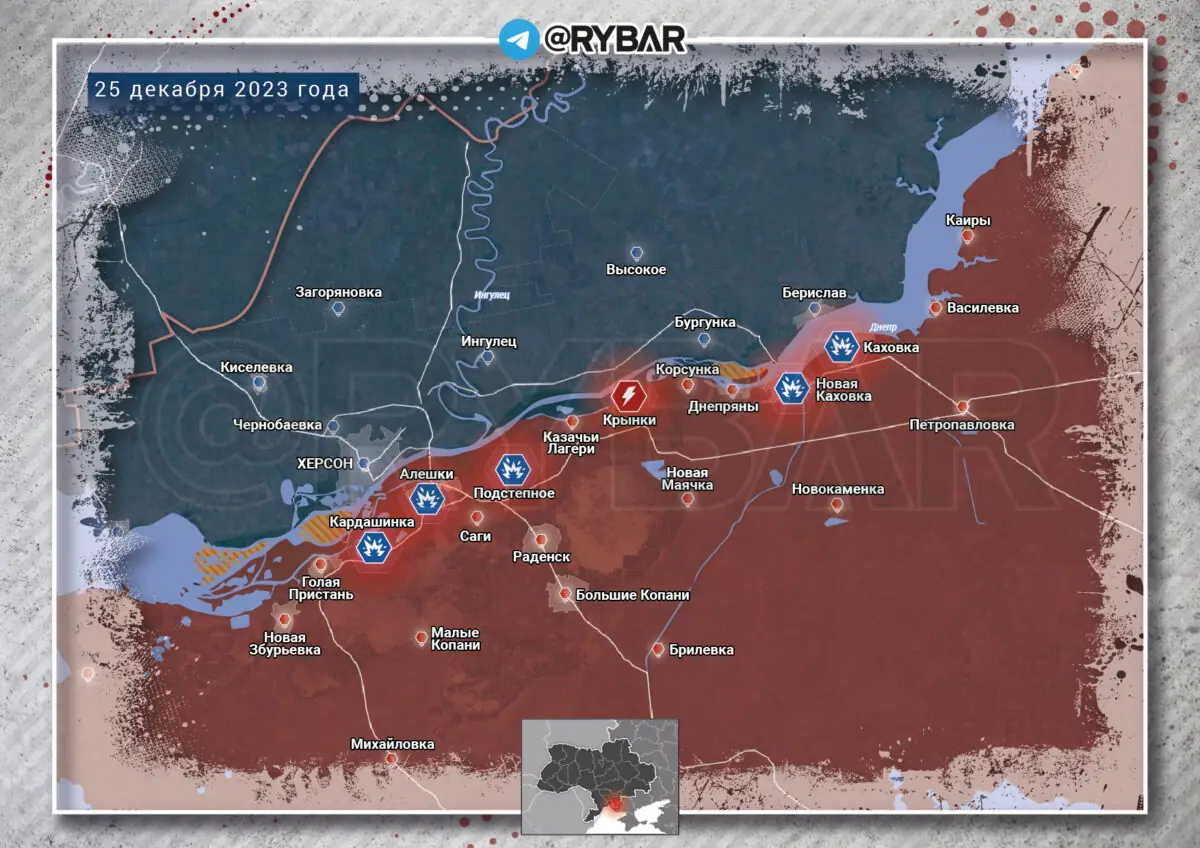
Ukrainian formations continue artillery terror on the left bank of the Kherson region . During the night, the enemy fired several dozen shells at Novaya Kakhovka , Kardashinka , Podstepnoye, Kakhovka and Aleshki ; no casualties were reported.
Political events
About the plans of the Ukrainian authorities to mobilize 500 thousand people In anticipation of acceptance into the so-called In Ukraine, the scandalous law on expanding mobilization, officials of the Kiev regime stated that the command of the Armed Forces of Ukraine requested the conscription of not less than 500 thousand people. How realistic is it for the Ukrainian authorities to implement this in the current situation? Purely theoretically, it is quite possible. The country’s mobilization resource has not been exhausted: the same youth who are in the so-called. Previously they tried not to touch Ukraine, but now they may well put it “under the gun.”
Yes, the burden on the economy will increase, but the country already lives on the help of the West, which does not yet intend to stop funding at least the Armed Forces of Ukraine and other security forces. And the example of Syria shows that the country’s descent into poverty with the disappearance of fuel and electricity does not mean its immediate collapse.
But in practice, everything is not so simple: to provide for such a mass of people, new large supplies of weapons are needed. But even in this case, there will be an increase in social tension: volunteers on the so-called. Ukraine, according to representatives of the Armed Forces of Ukraine, has already run out, and it will be more and more difficult for them to recruit people. Be that as it may, with total mobilization, the Kiev regime will be able to make up for at least part of the losses and continue to conduct hostilities. But it will inevitably face new costs, which will definitely (and not for the better) affect the combat effectiveness of the Armed Forces of Ukraine.
About the problems of the Ukrainian Armed Forces in Avdeevka and the real possibility of conducting offensive actions
Western media continue to escalate the situation regarding the temporary cessation of military supplies to the so-called. Ukraine from the US side. According to The Independent , Ukrainian soldiers, who chose to remain anonymous, report that Avdiivka could be lost in a few days without American weapons.
Representative of the 47th Mechanized Brigade of the Ukrainian Armed Forces, Dmitry Lazutkin, believes that the Ukrainian forces have enough forces and means to hold back the onslaught of Russian troops.
The unnamed Ukrainian general suggests that the Ukrainian Armed Forces only have enough manpower to hold their current positions, but if the situation worsens, they will not be enough.
The so-called “head of the local administration” Vitaly Barabash complains about a possible change in the front line and subsequent heavy losses from Ukrainian forces.
But not everyone agrees with such statements. The speaker of the Armed Forces of Ukraine from the Tauride direction, Alexander Shtupun , said that “there is no real threat of encirclement of Avdeevka.”
Articles on this subject also appeared in Western media. In an interview with the local publication Wyborcza, the former commander of the Polish ground forces, General Waldemar Skrzypczak , said that the Ukrainian Armed Forces are only capable of defending themselves due to Russia’s great advantage on the battlefield.
“The Ukrainians are announcing a new counter-offensive, but, in my opinion, it will not take place. The Russians have created such a big advantage that the Ukrainians now only need to defend themselves. Now the Russians are conquering new Ukrainian territories, including: fire superiority and firing 5-7 times more artillery shells per day than the Ukrainians,” the general said.
https://rybar.ru/chto-proishodit-v-zone ... -dekabrya/
Google Translator
*******
Angelic forces of revival
December 25, 23:27

Christmas tree of Ukrainian collaborators in 1942.
Now it is back in the mainstream in the Nazi-occupied territories of Ukraine.
https://colonelcassad.livejournal.com/8851919.html
One-legged one-eyed castrati on "Leopards"
December 26, 13:00

The new law on mobilization in Ukraine allows disabled people of the third group to be taken to the slaughterhouse even with the following defects:
1. The absence of one eye, blindness in one eye;
2. Paralysis of the hand, stump of the upper limb, absence of fingers;
3. Stump of the thigh or leg. Shortening of the leg by 7 centimeters or more;
4. Absence of a kidney, lung or bladder;
5. Castration in men;
6. Inoperable jaw defect, when a person cannot chew normally and loses weight.
One-legged, one-eyed castrati on "Leopards"...
https://colonelcassad.livejournal.com/8852833.html
BDK Novocherkassk damaged in Feodosia
December 26, 11:02
The Russian Ministry of Defense reported damage to the Novocherkassk large landing ship in Feodosia as a result of a night attack by cruise missiles.
The ship received significant damage, there were dead and wounded. Houses near the shore suffered minor damage, with glass broken out.
The downing of two Su-24s launching cruise missiles at Feodosia was also announced.
The FSB identified the people who filmed the missile attack on Feodosia and posted the video online. Those who post it face legal consequences.
https://colonelcassad.livejournal.com/8852469.html
Google Translator
*******
Happy Pretend Christmas, Ukraine
Declan Hayes
December 25, 2023
Ukraine is not only a neighbour of Russia but its etymological roots are in the Slavic for borderlands as Ukraine remains the borderlands between the might of Russia and whatever empires once lay to Russia’s west.
MI6’s hard line BBC, stirring it up as always, is at it again. This time, they are pretending that Ukraine is celebrating Christmas on a new date as part of its shift to distance itself from Russia, its fellow East European country which, as it happens, not only adjoins Ukraine but will adjoin it for eternity.
Christmas, the BBC informs us, now falls in Ukraine on December 25th “for the first time since 1917.”
Zelensky’s Christmas decree is, apparently “more than just a change of date from 7 January – the date for Christmas in the Julian calendar, which Russia uses” but is also “the continuation of a significant cultural shift in the country – the latest attempt to eradicate Moscow’s influence in Ukraine. The adoption of the Western, Gregorian calendar is also a sign of Kyiv’s (sic) continuing bid to align itself with Europe”.
Let’s just stop the BBC’s gallop there for a second. First off, Ukraine did not celebrate Christmas on December 25th in 1917. Ukraine in 1917 was in the throes of the Ukrainian Soviet War, whose belligerents included the Russian White Army, the Russian Red Army, the anarchist Revolutionary Insurgent Army of Ukraine and the Armies of the Second Polish Republic, amongst very many others.
December 25th 1917 itself was notable as the Bolsheviks proclaimed their Ukrainian government on that day and their 30,000 strong militia launched a major offensive against the Galician lines. No one in Ukraine was singing Christmas carols in the “European” tradition. They were either getting out of Dodge, or killing or being killed.
As regards January 7th, that is the Orthodox Christmas, as celebrated by the world’s Orthodox Christians, including those in Syria, Palestine, Romania, Ukraine, Bulgaria, Greece, Iceland, Ireland, Italy, Canada, Vietnam, Venezuela, Vanuatu and America.
Although Russia’s Orthodox Christians celebrate Orthodox Christmas with their own unique customs, theirs is only a variation in style, not in substance. The good Catholics of Russia and Belarus, where they form a not insignificant minority, celebrate Christmas on 25 December and, in many cases, as they do in Palestine and Syria, also on January 7th with their compatriots and fellow brothers and sisters in Christ. And why not?
Next off, Russia is as integral a part of Europe as are Sweden and Sicily. I mention those two countries as both have a deep devotion to St Lucy (Sancta Lucia), as did Irish writer James Joyce, who named his daughter after this pan-European saint.
I cite Sicily as a country because Sicilians refer to mainland Italy as Europe, or the Continent. They see themselves as being separate but the same and, say what you like about Sicilians but they don’t have the stupid hang ups about their neighbours Ukrainian fascists and their BBC enablers have.
Speaking of St Lucy, the patron saint of light, let’s return to the BBC to see what further light these Luciferians can throw on matters.
The article then switches its attention to some Ukrainian factory or other that makes Christmas decorations, baubles and the like, “small pieces of Christmas cheer”, as our ex rugby playing BBC correspondent calls them.
Fair enough. However, this year, Rugby man notices a distinct “military theme. Miniature soldiers, MiG fighter jets, even a Ukrainian tractor pulling a Russian tank – all hang from a shelf, destined for a Christmas tree”. So much for Jesus, the Prince of Peace, as described in our recent editorial.
The BBC’s rugby correspondent next pops in on Father Andriy of Zelensky’s schismatic Orthodox Church of Ukraine who laments that “unfortunately for many people in the world, Ukraine is linked to Russia. And Ukraine is always viewed in the context of being a neighbour of Russia.”
Without being too pedantic about it, Ukraine is not only a neighbour of Russia but its etymological roots are in the Slavic for borderlands as Ukraine remains the borderlands between the might of Russia, once epitomised in the sprawling tsarist Empire, and whatever empires once lay to Russia’s west. That is just the way it was and it is.
Father Andriy does not see eye to eye with me on this. To him, Ukraine is “more a neighbour of Europe. And the fact that we’ve now changed the calendar is not shifting away from Russia. It is us returning back to Europe, where we belong”.
So Ukraine belongs with Sweden and Sicily, who honour St Lucy and Moldova (97% Orthodox), Greece (90% Orthodox), Serbia (85% Orthodox), Romania (81% Orthodox), Georgia (84% Orthodox), Cyprus (73% Orthodox), Montenegro (72% Orthodox), North Macedonia (70% Orthodox), Russia (79% Orthodox) and Belarus (73% Orthodox). No arguments there, as long as myopic schismatics keep their distance and stop imprisoning and slaughtering non schismatics.
Although the article finishes by asking this schismatic priest whether he can ever forgive Russia for defending the Orthodox Christians of the Borderlands, that is the wrong question no matter whether Zelensky and his propagandists use either the Gregorian or Julian calendar. There are over 500,000 dead Ukrainian soldiers as a result of this needless war and Zelensky, together with Father Andriy and all other schismatics and BBC propagandists, should be begging the families of those martyrs for forgiveness.
But the BBC would need a smidgen of self-awareness to do that because, adjoining that stupid article on Christmas in the rump Reich is another revealing one on Ukrainian “refugees” returning home from Blighty to Ukraine on holidays for the festive season. Here in Ireland, we have Ukrainians like this “esteemed surgeon”, who is currently before the courts for slashing another Ukrainian draft dodger. The luck of the Irish!
And though all of those freeloaders could claim, with some legitimacy, to be victims of Zelensky’s stupid and totally avoidable war Christmas, by any calendar, can only make sense if we do some self-reflection, no matter if we bless ourselves in the Orthodox or “European” (= Latin/Sicilian Catholic) way.
Whereas the Europeans of Russia and the Caucasus seem eminently able for that task, it seems to be beyond the ken of the spokespeople for the Europeans of the Borderlands, who don’t know who or what they are. Europe’s Swedes, Sicilians, Calabrians, Armenians, Georgians and Russians all have their own customs, mannerisms and so forth and there is beauty in each and every one of them, as there are in all things under God’s sun. The extremist BBC can encourage Zelensky’s propagandists to deck their Christmas trees with “miniature soldiers, MIG fighter jets, even a Ukrainian tractor pulling a Russian tank” till the cows come home. But, for millions of Ukrainians, Christmas, by either or both calendars, will not be a time for decking the halls with boughs of holly and, with their loved ones either recently buried in the local cemetery or missing, presumed dead in action, it certainly will not be “the season to be jolly”.
Christmas in Ukraine, to me at least, is best typified by Gonzalo Lira, the (atheistic?) Kononovich twins, and all those priests and lay people who tried to defend their faith and their homeland against Father Andriy and Zelensky’s other brown priests. And, like the Orthodox Christians of Syria and Palestine, who are today at the mercy of the same forces the BBC, Father Andriy, Zelensky and their ilk typify, they are not only in our thoughts and prayers but very much in our hopes and actions for a better, more civilised world than the one those who deck their Christmas trees with “miniature soldiers, MIG fighter jets, even a Ukrainian tractor pulling a Russian tank” kill for.
https://strategic-culture.su/news/2023/ ... s-ukraine/
******
The New York Times’ Alleged Scoop About Putin’s Peace Push Is Actually Old News
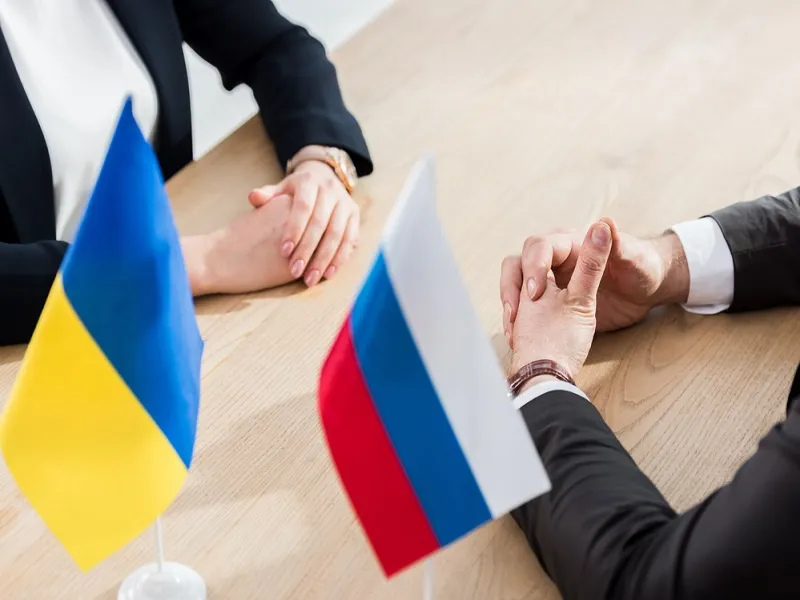
ANDREW KORYBKO
DEC 26, 2023
The Financial Times candidly spelled out the perception management plan that the New York Times is now dutifully following to a tee, all for the purpose of preconditioning the public to accept a compromise for ending this proxy war.
The New York Times (NYT) published a piece on Saturday about how “Putin Quietly Signals He Is Open to a Cease-Fire in Ukraine”, which claimed that he’s been sending out feelers about this since September after fall 2022’s allegedly initial such attempt failed. The rest of the article explains how he supposedly came around to countenancing what’s presented by them as his tacit admission of strategic defeat. It then predictably ends on a skeptical note implying that neither he nor his country can be trusted.
For as intriguing as all this might sound to the average Westerner, the fact of the matter is that this alleged scoop is actually old news, and the details thereof were spun for political purposes. It was already assessed in September 2022 during four former Ukrainian regions’ referenda that “Russia’s Special Military Operation Might Soon Transform Into A Defense Of Its Own Borders” and that “Russia Will Still Strategically Win Even In The Scenario Of A Military Stalemate In Ukraine”.
Those analyses argued that Russia’s priority is to remove NATO-backed Ukrainian forces from the entirety of its newly unified regions, which presciently foresaw that the Line of Contact (LOC) would barely change from then until now with the notable exception of northern Kherson Region in November 2022. These calculations could have been accompanied by President Putin sending out some feelers to gauge whether that goal could possibly be achieved by diplomatic means as part of a larger deal.
He revealed in June of this year that spring 2022’s Istanbul peace process saw both sides agreeing on Ukraine’s return to constitutional neutrality and the imposition of strict limits upon its armed forces so there’s a certain logic inherent in him floating the restoration of that deal in fall 2022 after the referenda. He also strongly signaled that a political solution to the NATO-Russian proxy war is still possible on three separate occasions in the middle of that month so long as the West first curtails its arms supplies to Kiev.
President Putin’s admission of naivety about the West during his annual Q&A session was interpreted here as signaling that all such prior peace feelers shouldn’t be mistaken by the West as weakness since he said during the same event that Russia’s three goals will still be achieved. These are demilitarizing Ukraine, denazifying it, and restoring that country’s constitutional neutrality. He also reiterated that they could be accomplished by diplomatic means but that military ones will continue to be pursued if not.
Several days after his session, “The Financial Times Spun Ukraine’s Defeat As A Victory To Justify Freezing The Conflict” along the lines of the “land-for-peace” proposal pushed by Republican presidential candidate Ramaswamy, former NATO Supreme Commander Admiral Staviridis, and Senator Vance. That outlet quoted an unnamed former US official who explicitly stated that “We have to flip the narrative and say that Putin has failed” in order to craft the publicly plausible pretext for bringing this about.
Therein lies the ultimate narrative significance of the NYT’s falsely described scoop that spun everything in such a way as to mislead their targeted Western audience into thinking that President Putin tacitly admitted strategic defeat and is desperate for a ceasefire. As was earlier clarified, all of his actual and speculative peace feelers were aimed at achieving his country’s three goals through diplomatic means building upon the Istanbul peace process from spring 2022, not freezing the conflict for the sake of it.
The security concessions that Russia is requesting in exchange for an armistice, which importantly wouldn’t result in either it or Ukraine rescinding their territorial claims against the other, aren’t yet something that the West feels comfortable with. That New Cold War bloc seems sincerely interested in having Ukraine resume some sort of dialogue with Russia as the conflict winds down, ergo its recent pressure upon Zelensky to that end, but those aforesaid concessions are a bridge too far right now.
Even so, the resumption of any talks would still represent a significant diplomatic concession after Ukraine formally ruled this out while the West said that it won’t participate in any discussions over that country’s future without it, hence this newfound information campaign. The Financial Times candidly spelled out the perception management plan, which the NYT is now dutifully following to a tee, all for the purpose of preconditioning the public to accept a compromise for ending this proxy war.
None of this insight is to suggest that another round of escalation isn’t possible, especially after Belarus warned that Poland is preparing to launch Belgorod-like terrorist proxy incursions, but just that this is the general direction in which everything is going after summer’s failed counteroffensive. In the absence of any Plan B and provided that no serious provocations transpire, the writing is on the wall, and it clearly says that the West is moving closer towards complying with Russia’s security requests in Ukraine.
https://korybko.substack.com/p/the-new- ... eged-scoop

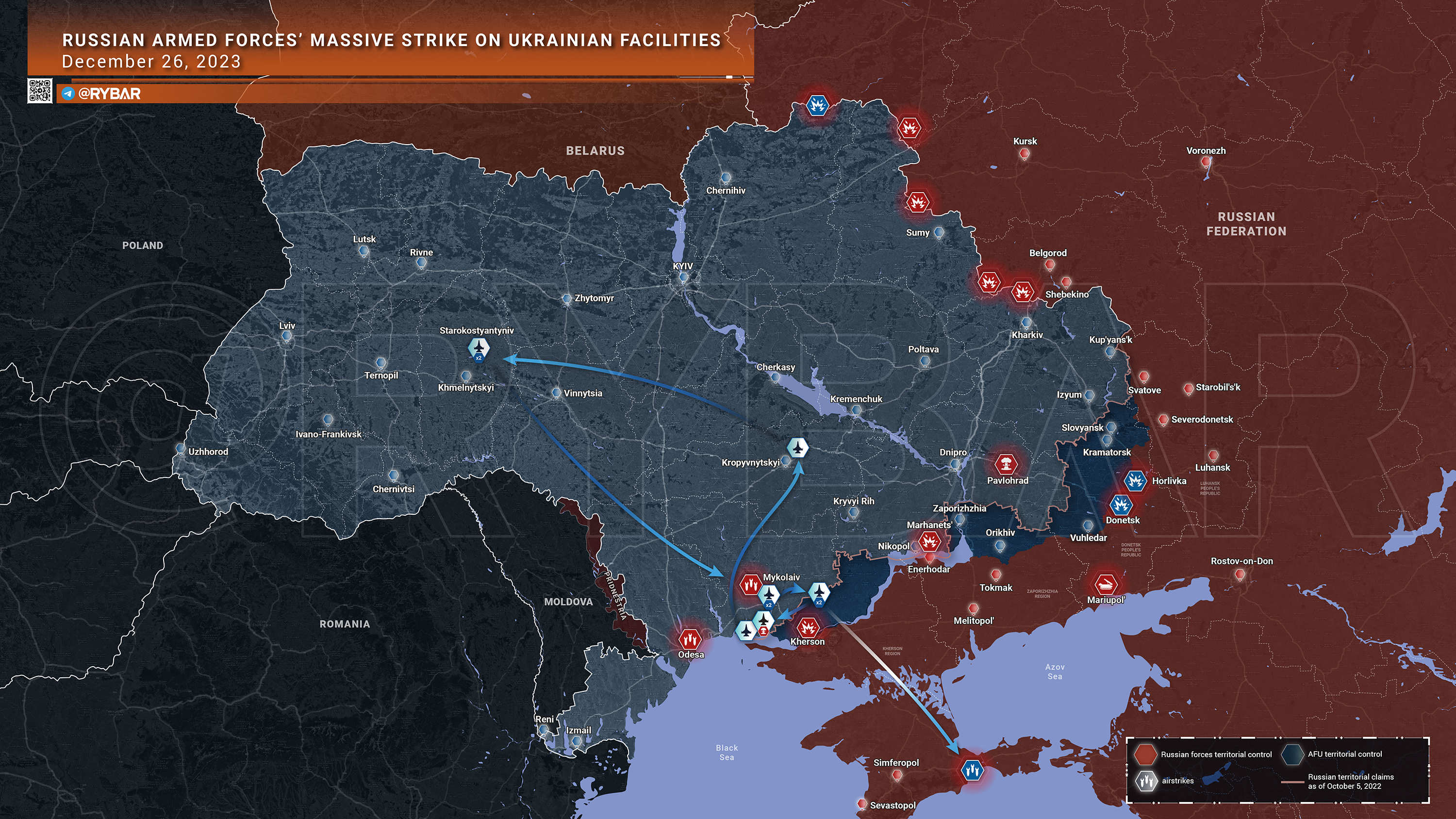
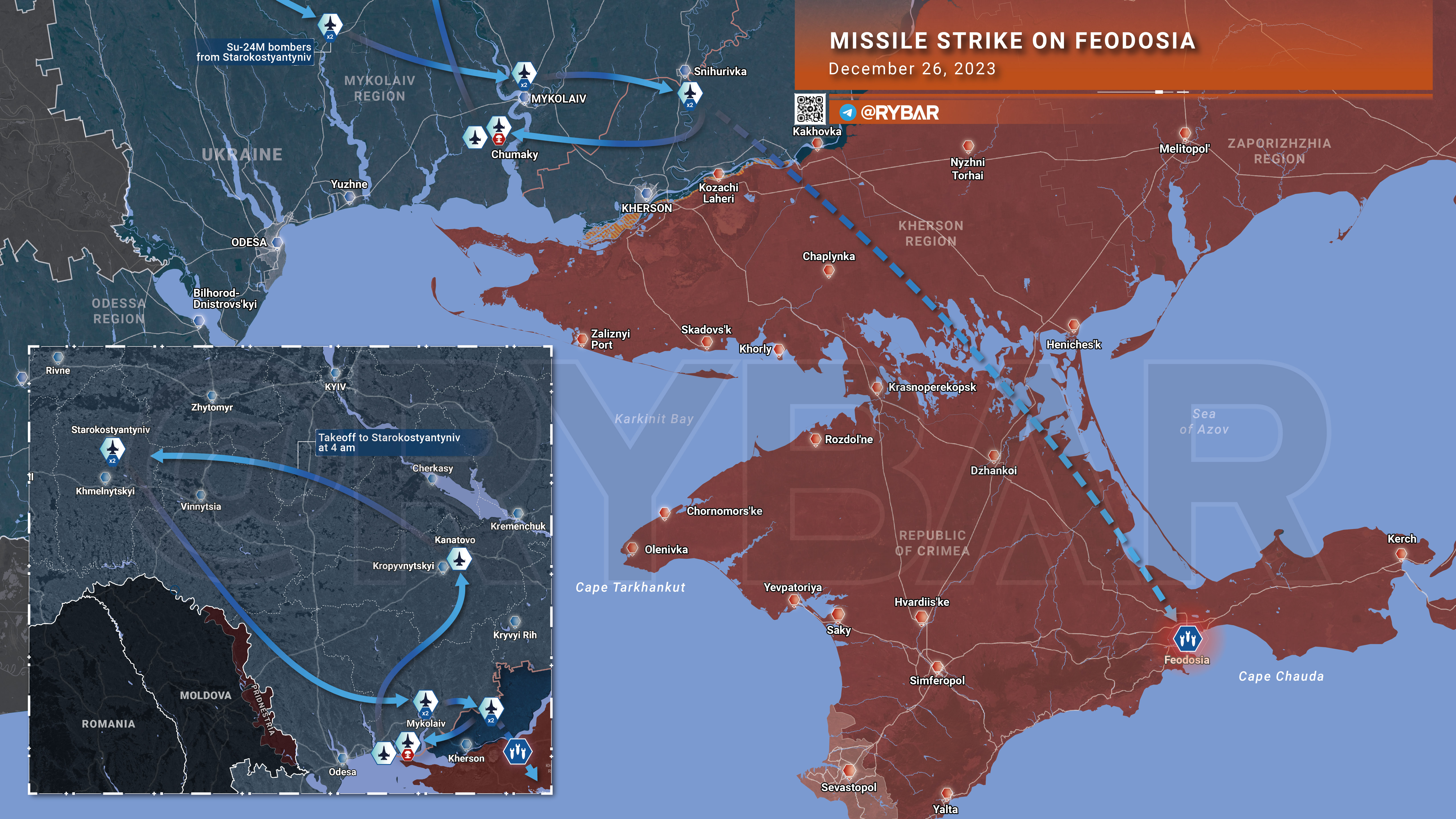
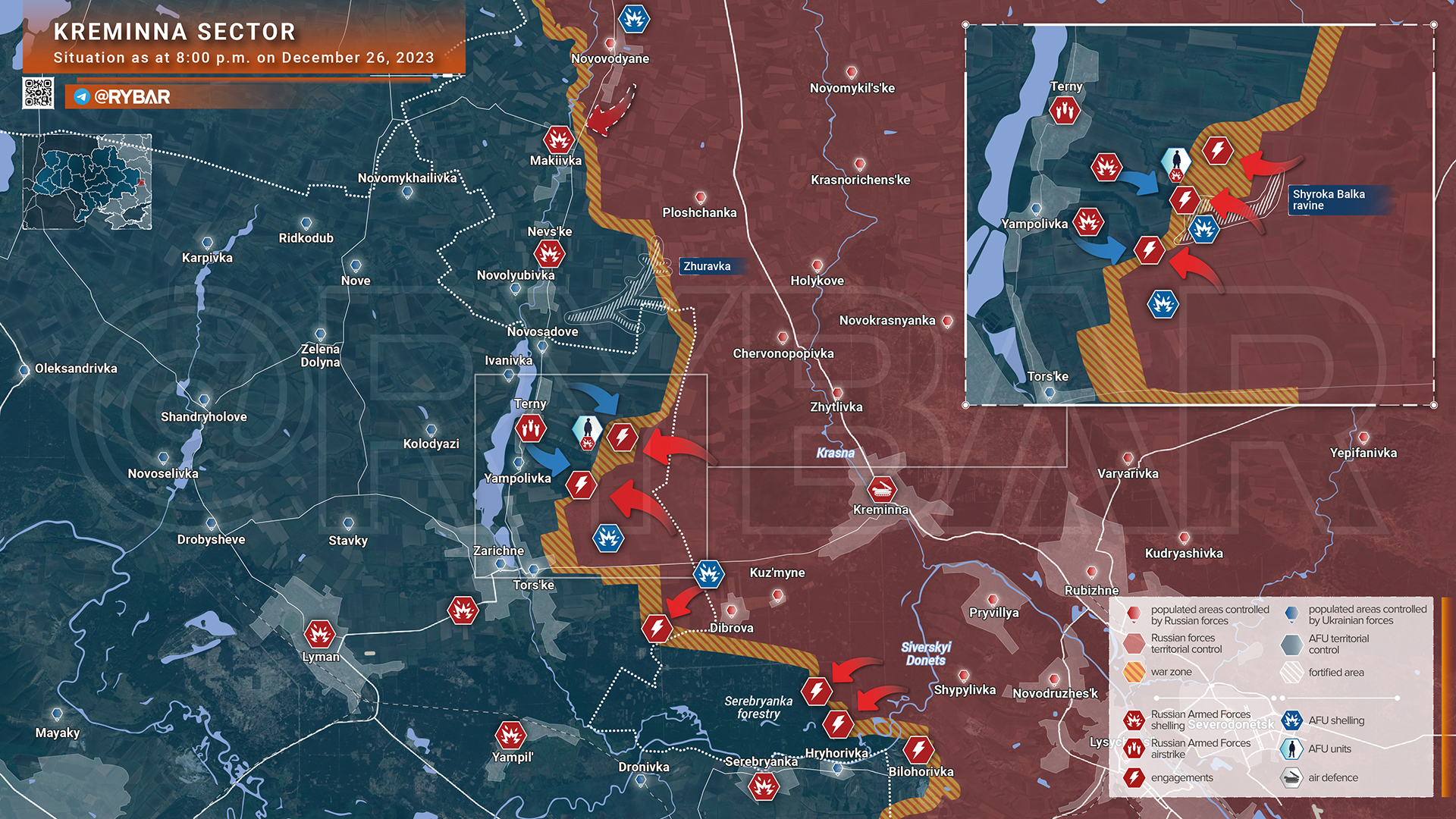













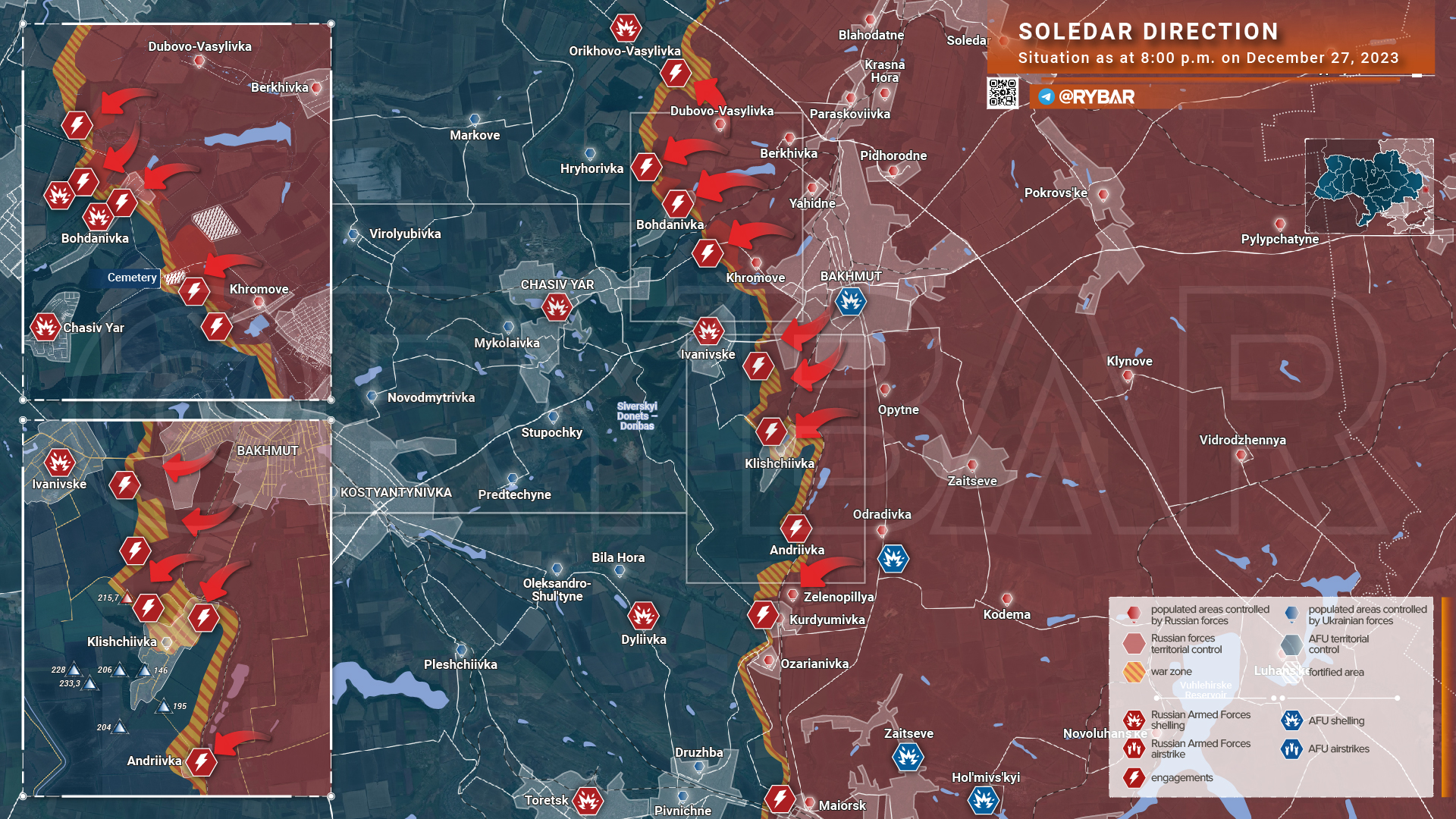
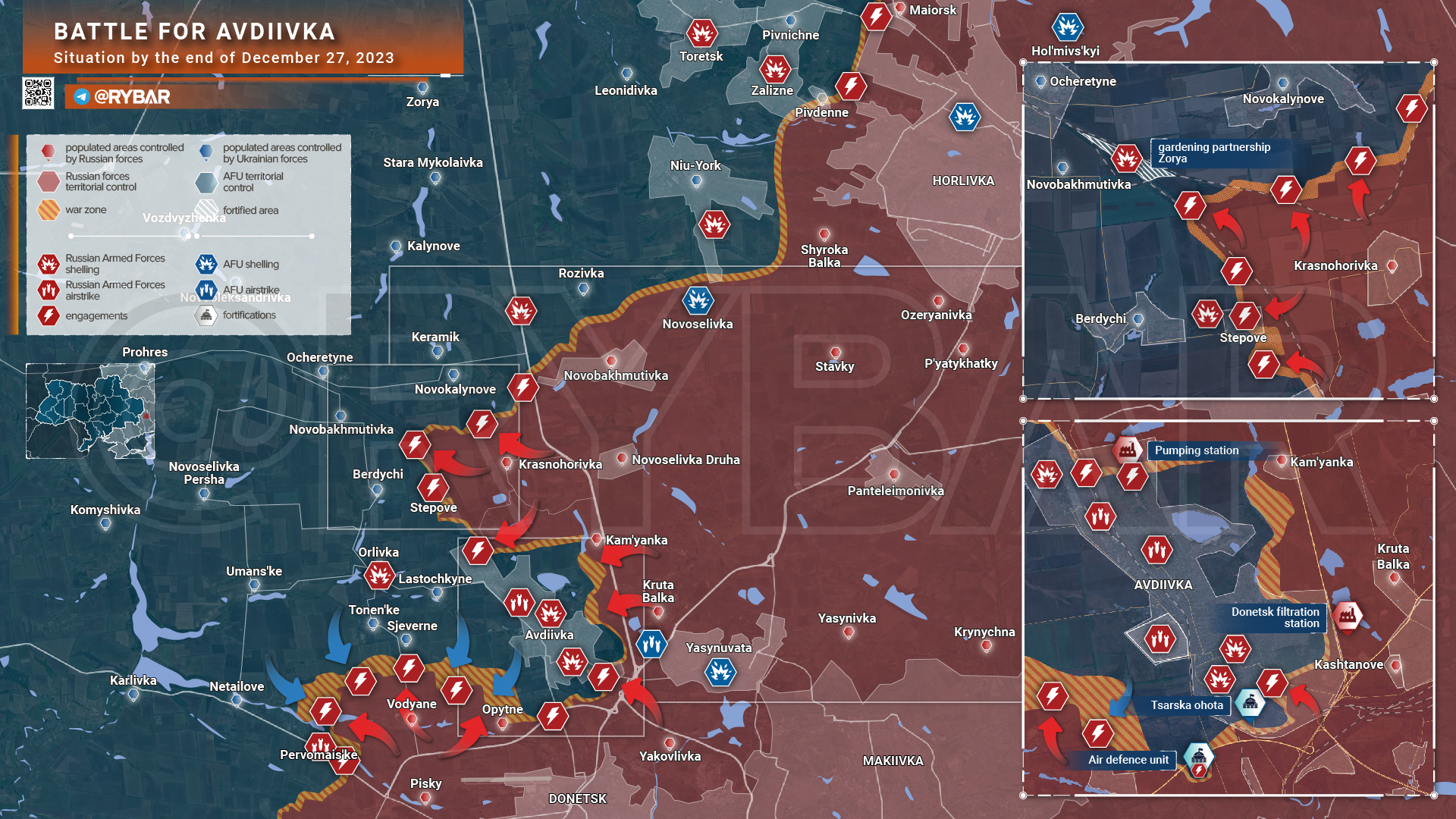


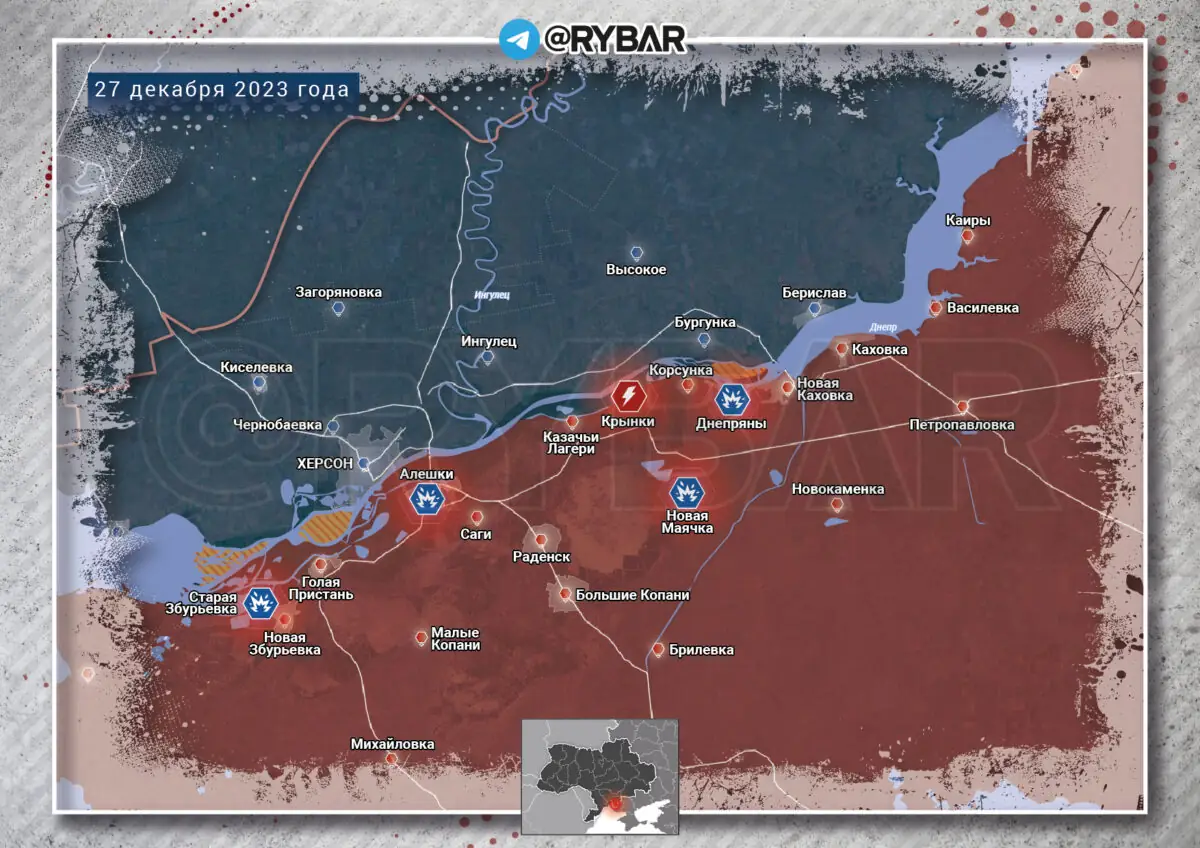
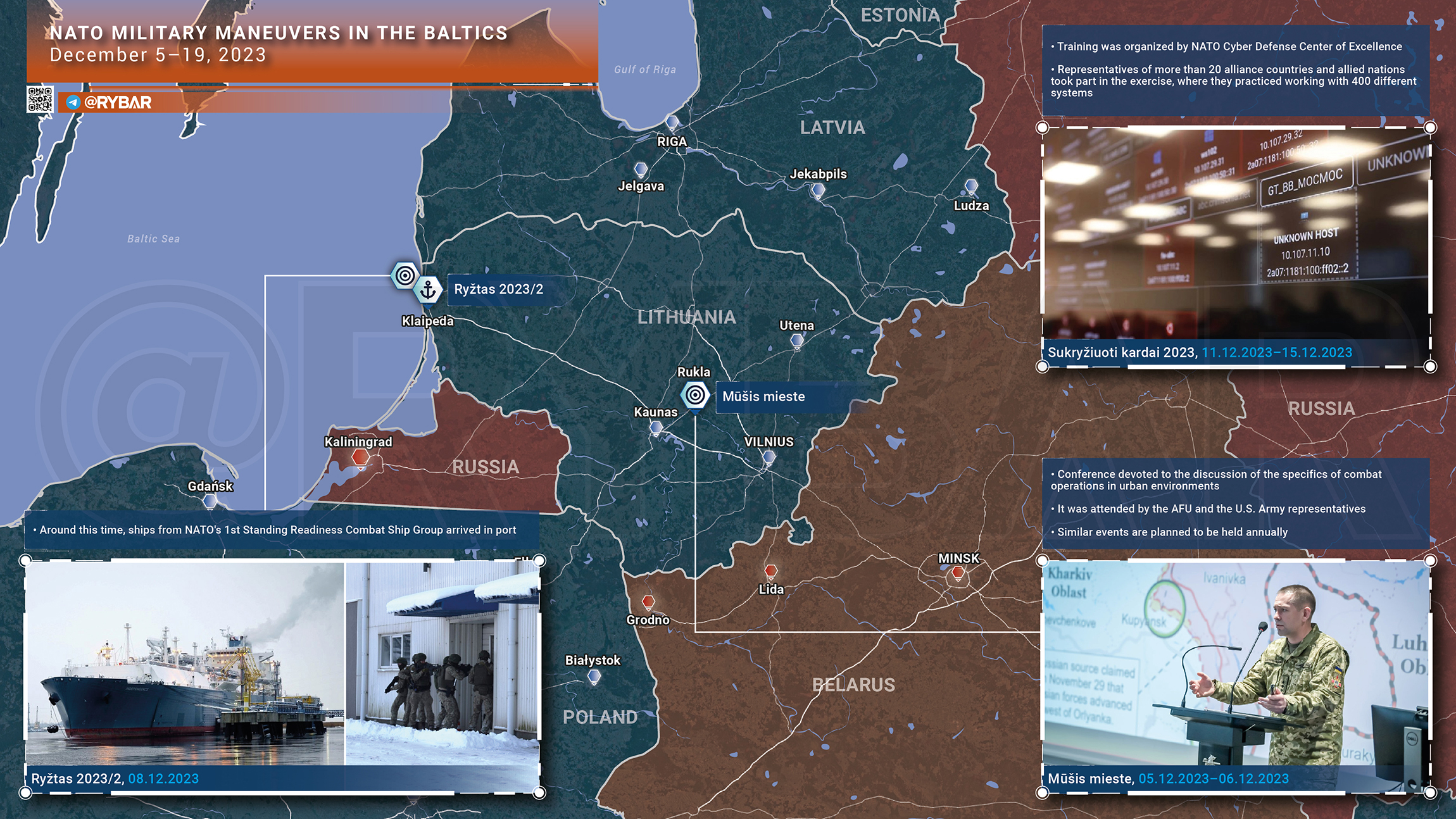
 SIMPLICIUS THE THINKER
SIMPLICIUS THE THINKER